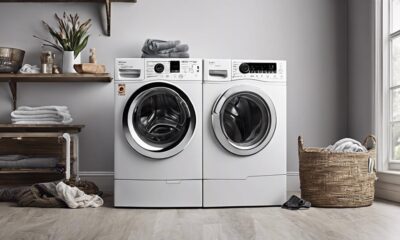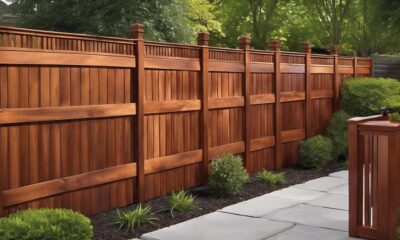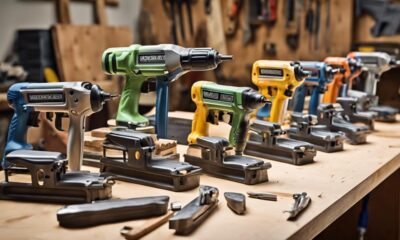Appliances
Top 15 Alexa-Compatible Smart Home Devices
2025
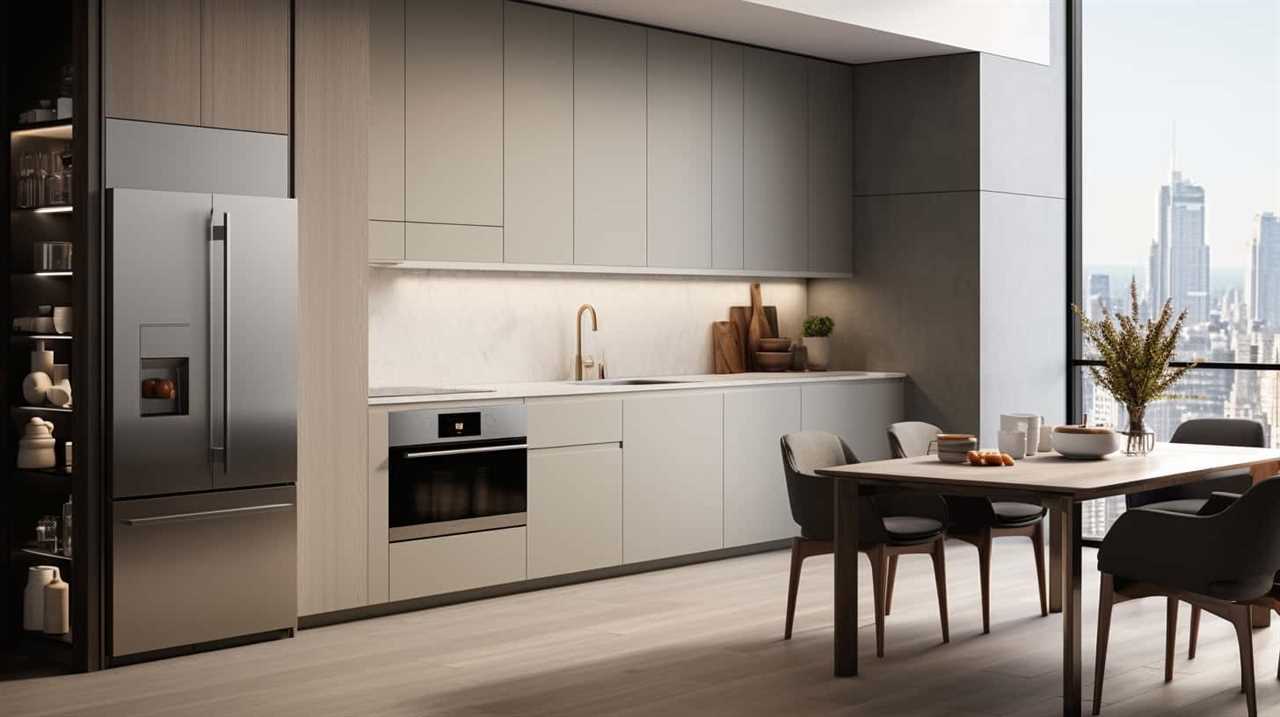
Are you interested in discovering the top 15 smart home devices that work with Alexa? We’ve conducted thorough research and are excited to share our results with you.
In this guide, we will explore a range of cutting-edge technologies that can transform your home into a more convenient and efficient space. From voice-controlled lighting to smart kitchen appliances, these devices offer a seamless integration with Amazon’s Alexa, allowing you to control your home with just a few simple voice commands.
Whether you’re a tech-savvy homeowner or someone looking to upgrade their living space, this comprehensive list will provide you with the knowledge and expertise you need to make informed decisions about the best smart home devices for your needs.
So let’s dive in and discover the possibilities that await!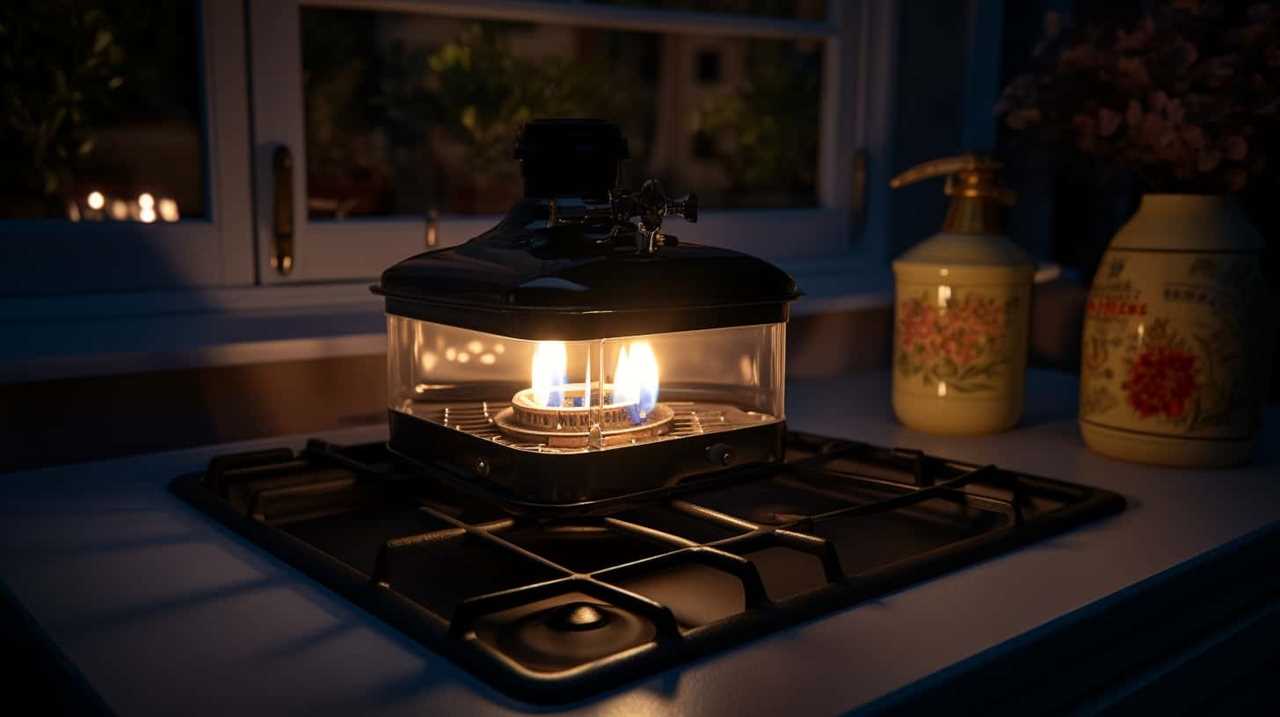
Key Takeaways
- Voice-controlled smart lighting allows for easy control of lights through voice commands, offering convenience and energy-saving options.
- Smart home security systems, such as smart locks and doorbells, provide enhanced security features, real-time notifications, and keyless entry for peace of mind.
- Home automation hubs act as a central control system for various smart home devices, ensuring compatibility and advanced automation features.
- Energy efficiency and monitoring can be achieved through smart thermostats, LED bulbs, motion sensors, and smart plugs, promoting eco-friendly practices and optimization of resources.
Smart Thermostats
We recommend installing a smart thermostat for an efficient and convenient home heating and cooling system. Smart thermostats offer energy efficient options and programmable settings that allow you to have greater control over your home’s temperature.
These devices use advanced technology to learn your preferences and adjust accordingly, resulting in significant energy savings. With programmable settings, you can set specific temperatures for different times of the day, ensuring that your home is always comfortable when you need it to be.
Additionally, smart thermostats can be controlled remotely through smartphone apps, so you can adjust the temperature even when you’re not at home. This feature isn’t only convenient but also allows you to save energy by adjusting the temperature based on your schedule.
Some smart thermostats also have the ability to integrate with other smart home devices, such as voice assistants, allowing you to control the temperature using voice commands.
Voice-Controlled Lighting
Voice-controlled lighting offers numerous benefits for homeowners.
With the ability to control your lights using just your voice, you can easily turn them on or off, adjust brightness, and even change colors without having to get up or use your smartphone.
This integration with smart assistants like Alexa allows for seamless control and automation of your lighting system.
Additionally, voice-controlled lighting can also include energy-saving options, such as LED bulbs, timers, and motion sensors, helping you reduce your energy consumption and lower your electricity bills.
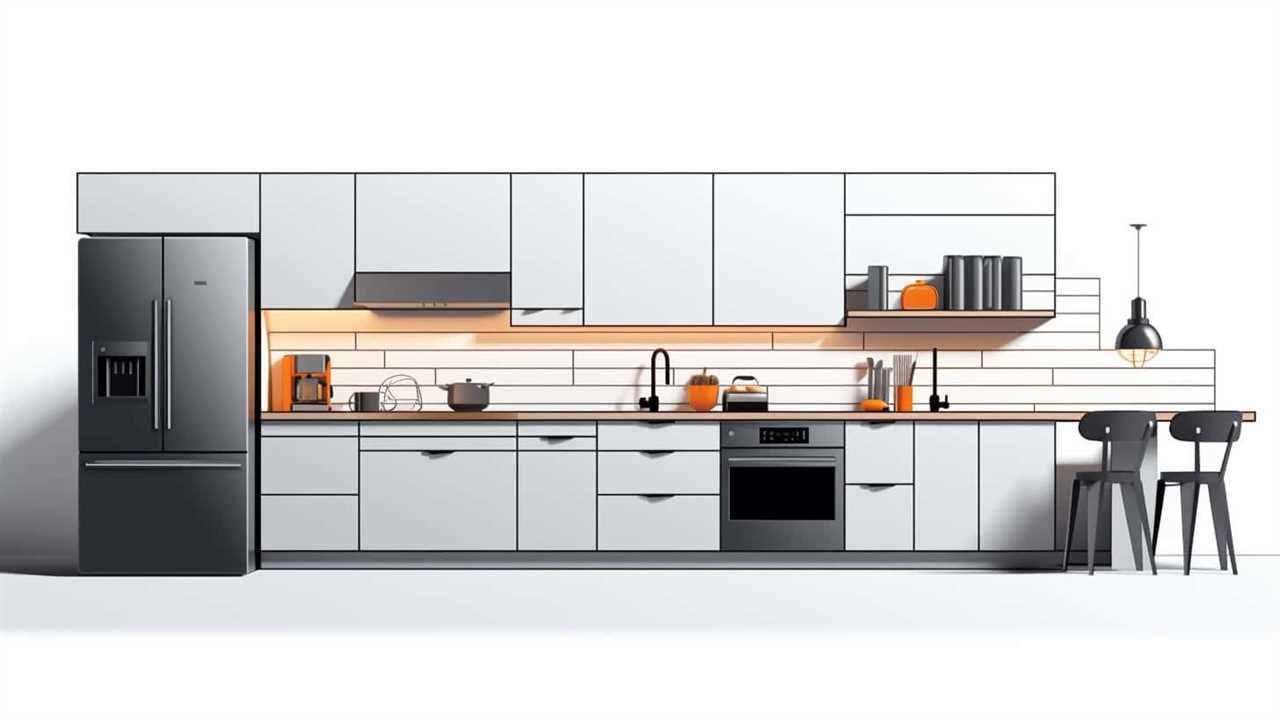
Benefits of Voice Control
Using voice control for lighting provides convenient and hands-free control over the illumination in our smart homes. Not only does it make it easier to turn lights on and off, but it also offers a range of benefits that enhance our overall smart home experience. Firstly, voice-controlled lighting improves accessibility by allowing individuals with mobility issues to easily control their lights without the need to physically interact with switches or dimmers. This promotes independence and convenience for people with disabilities or elderly individuals. Additionally, privacy concerns are addressed with voice control, as it eliminates the need for motion sensors or cameras to detect our presence and adjust the lighting accordingly. With voice commands, we can effortlessly create the desired ambiance and set the perfect lighting scene for any occasion.
| Benefits of Voice-Controlled Lighting |
|---|
| Improved Accessibility |
| Convenient and Hands-Free Control |
| Enhanced Privacy |
| Effortless Lighting Scene Setup |
| Energy Efficiency |
Voice control seamlessly integrates with smart assistants, making it even more powerful and versatile.
Integration With Smart Assistants
Our smart home devices seamlessly integrate with Alexa, allowing us to control our voice-controlled lighting with ease. By connecting our lighting systems to Alexa, we can effortlessly adjust the brightness, color, and even create custom lighting scenes using simple voice commands. This integration enhances the convenience and functionality of our smart homes, giving us the ability to control our lighting from anywhere in our home without having to physically interact with switches or dimmers.
However, it’s important to note that while voice-controlled lighting offers numerous benefits, it also raises privacy concerns with voice assistants. As technology continues to advance, it’s crucial to stay informed and take necessary precautions to protect our personal information.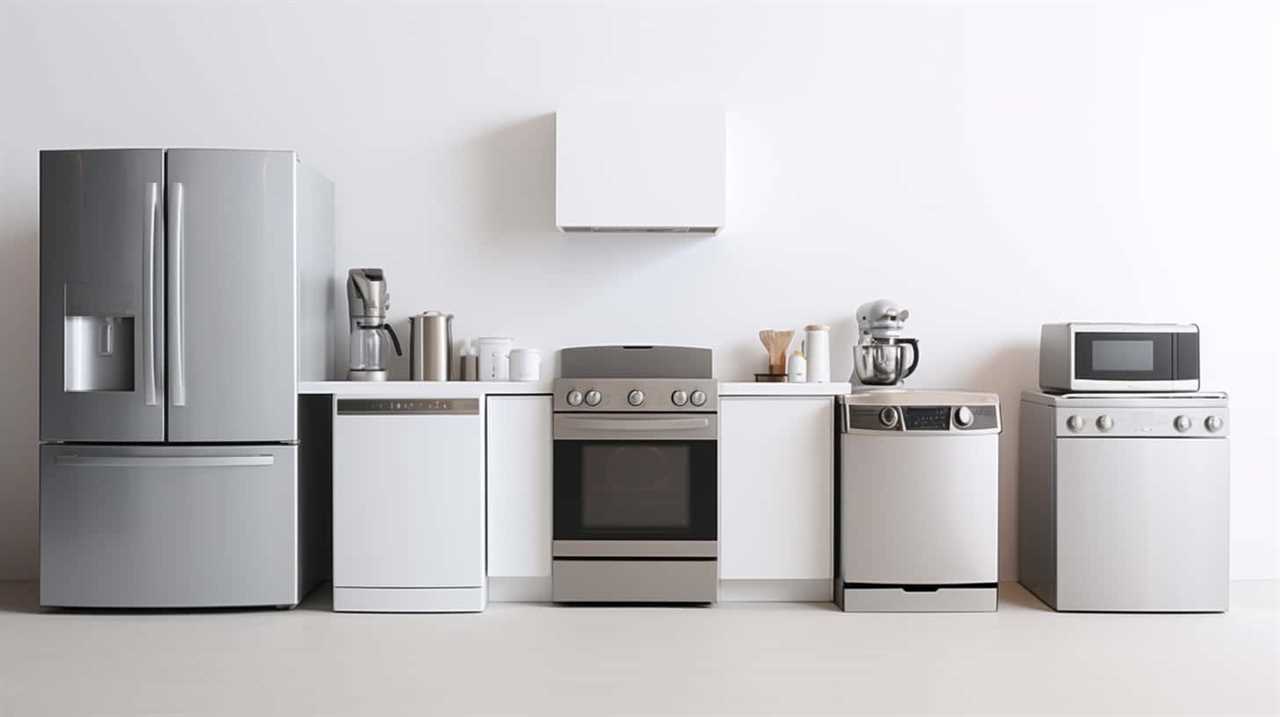
Now, let’s explore the next section about energy-saving lighting options.
Energy-Saving Lighting Options
One option for energy-saving lighting in our smart home is to utilize voice commands for controlling the brightness, color, and custom lighting scenes. By integrating voice-controlled lighting systems into our home, we can easily adjust the lighting settings without the need for physical switches or dimmers. This not only adds convenience but also helps to reduce energy consumption.
Energy efficient bulbs, such as LED lights, can be paired with motion sensor lights to further enhance energy savings. These motion sensor lights automatically turn on when they detect movement and switch off when the area is vacant. This ensures that lights are only used when needed, minimizing unnecessary energy usage.
With voice-controlled lighting, we can create a more energy-efficient and eco-friendly smart home environment.
Transition: Now that we’ve explored energy-saving lighting options, let’s move on to the next section about smart locks and doorbells.
Smart Locks and Doorbells
The article features a selection of Alexa-compatible smart home devices, and now we’ll explore the category of smart locks and doorbells. Smart locks and doorbells are essential components of a modern, secure home. They offer convenience, peace of mind, and enhanced security features that traditional locks and doorbells can’t match.
When it comes to smart locks and doorbells, there are several benefits to using these devices:
- Enhanced Security: Smart locks provide an extra layer of security for your home. With features like keyless entry, you can control access to your home from anywhere. You can also receive real-time notifications whenever someone enters or exits your home, giving you peace of mind.
- Convenience: With smart locks, you can say goodbye to fumbling for keys or worrying about forgetting to lock the door. You can easily lock and unlock your door using your smartphone or voice commands through Alexa.
- Integration with Alexa: Smart locks and doorbells that are compatible with Alexa allow for seamless integration into your smart home ecosystem. You can control your locks and doorbells hands-free, using simple voice commands.
- Remote Access: Another advantage of smart locks and doorbells is the ability to remotely control and monitor your home. Whether you want to let in a visitor while you’re away or check who’s at the door from the comfort of your couch, smart locks and doorbells make it possible.
- Customization and Automation: Smart locks and doorbells offer customization options that allow you to tailor their functionality to your specific needs. You can create unique access codes for different individuals, set schedules for automatic locking and unlocking, and integrate them with other smart devices in your home.
Investing in smart locks and doorbells can greatly improve the security and convenience of your home. With their advanced features and integration with Alexa, these devices provide a seamless and efficient smart home experience.
Wi-Fi Enabled Security Cameras
When it comes to Wi-Fi enabled security cameras, there are two main points to consider: privacy concerns and integration with Alexa.
Privacy is a significant concern with security cameras as they can potentially invade our personal space.
However, with the integration of Alexa, these cameras can be easily controlled and monitored, providing an added layer of convenience and security.
Privacy Concerns With Cameras
We have noticed a growing concern regarding the privacy of Wi-Fi enabled security cameras. As these cameras become increasingly popular for home surveillance, there are valid privacy concerns that users should be aware of.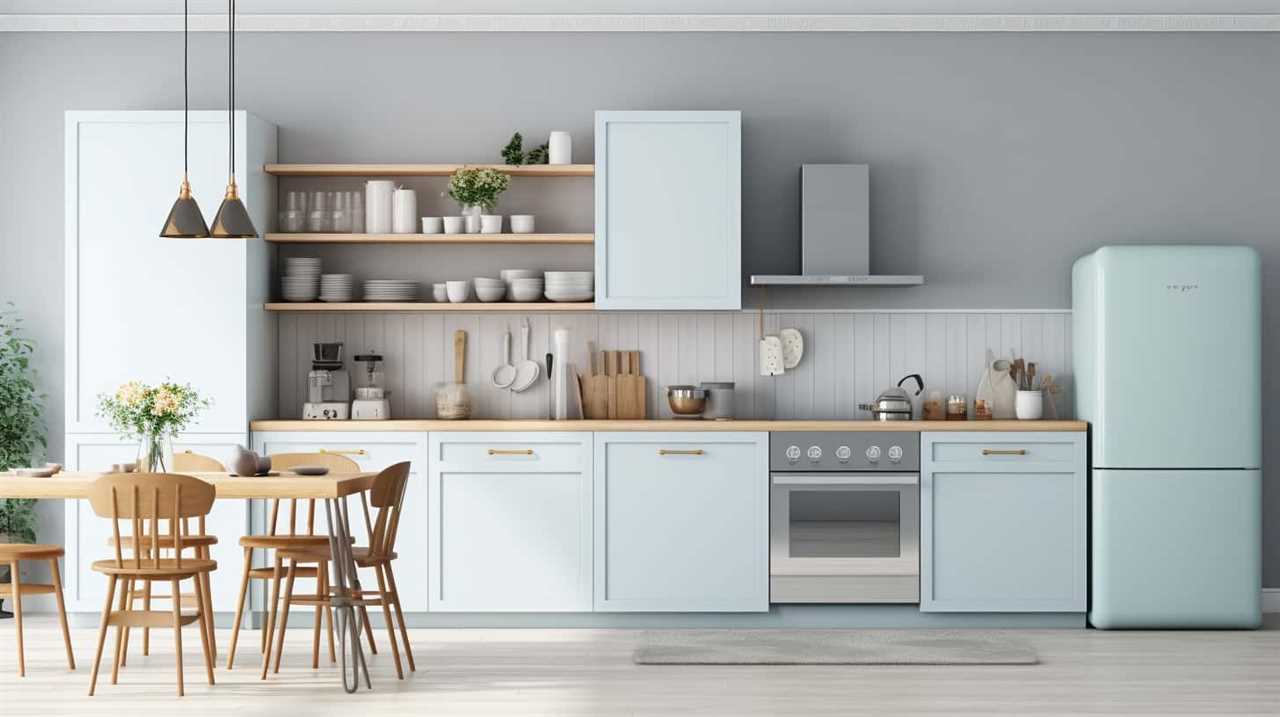
Here are some key points to consider:
- Potential hacking: Wi-Fi enabled security cameras are vulnerable to hacking, which can compromise your privacy and allow unauthorized access to your footage.
- Data security: There’s a risk of your personal data being stored on the cloud, where it could potentially be accessed or breached by hackers.
- Surveillance issues: Some individuals worry about the potential abuse of surveillance cameras, as they can be used for unauthorized monitoring or invasion of privacy.
It is crucial to take steps to protect your privacy when using Wi-Fi enabled security cameras, such as using strong passwords, regularly updating firmware, and being cautious about sharing access to your cameras.
Integration With Alexa
After addressing the privacy concerns associated with Wi-Fi enabled security cameras, it’s important to explore their integration with Alexa for a seamless smart home experience.
Wi-Fi enabled security cameras have become an essential part of a smart home setup, allowing homeowners to monitor their property remotely.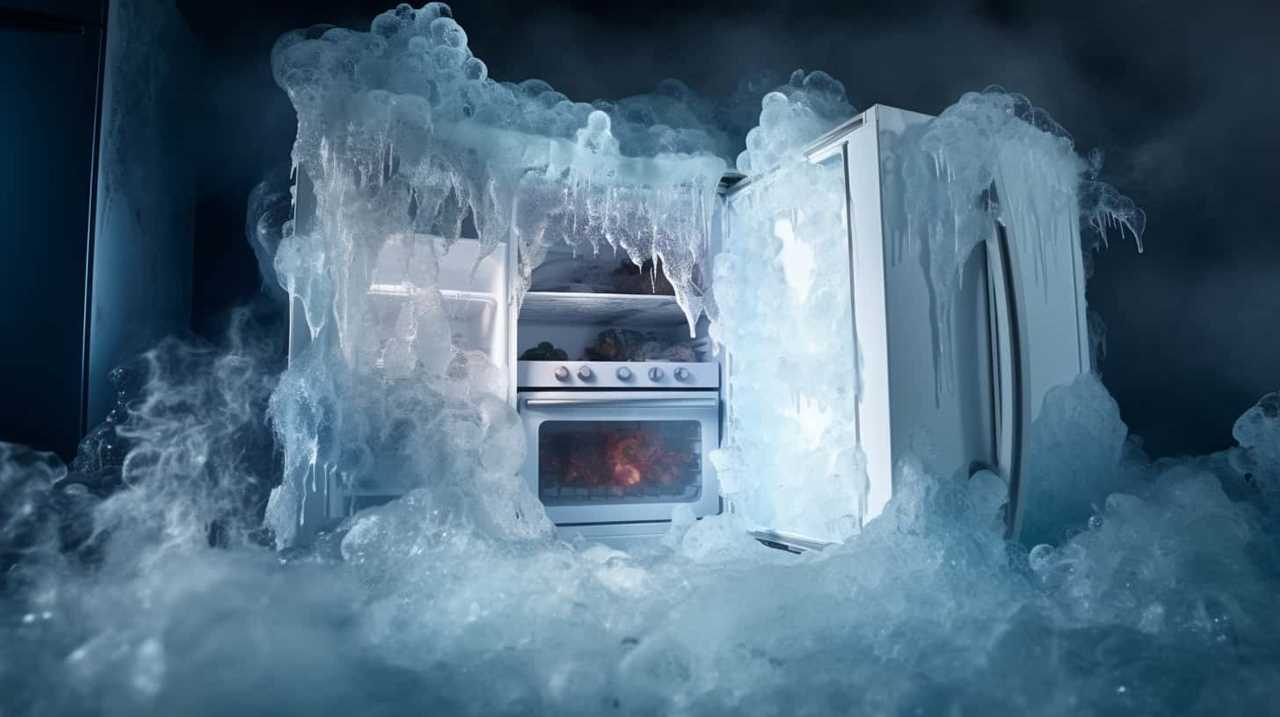
With the integration of Alexa, users can now control these cameras using voice command technology, enhancing convenience and accessibility. By simply saying commands like ‘Alexa, show me the front door camera,’ users can instantly view live footage from their security cameras on compatible devices such as Echo Show or Fire TV.
This integration not only adds a layer of convenience but also promotes a more energy-efficient approach by allowing users to turn off cameras when not needed, reducing unnecessary energy consumption.
The combination of Wi-Fi enabled security cameras and Alexa voice control technology creates a powerful and efficient home security system.
Smart Plugs and Switches
The smart plugs and switches are essential devices for creating a connected home experience with Alexa. These devices offer a seamless integration with Alexa, allowing users to control and automate their electrical appliances with voice commands.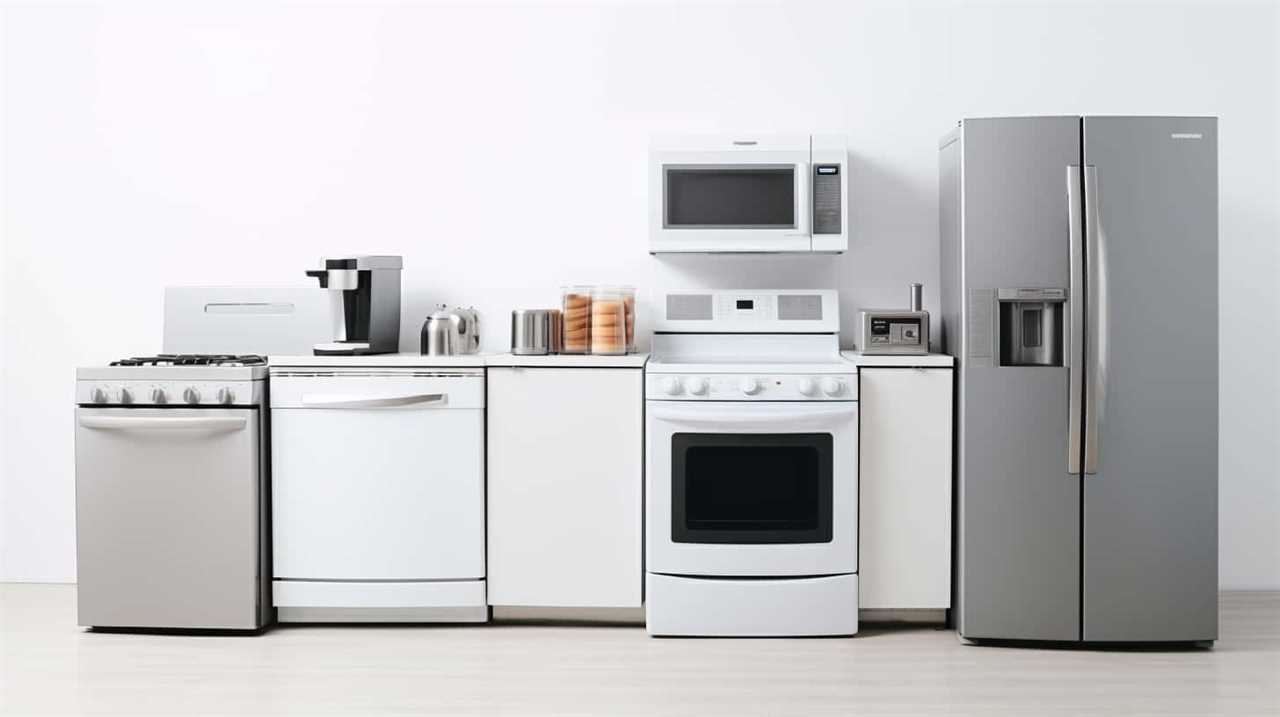
Here are two key features that make smart plugs and switches a must-have for any smart home enthusiast:
- Energy Monitoring: Smart plugs and switches equipped with energy monitoring capabilities provide users with valuable insights into their energy consumption. With the ability to track and monitor the energy usage of connected devices, users can make informed decisions to reduce their energy consumption and save on utility bills.
- Remote Control: One of the most convenient features of smart plugs and switches is the ability to control connected appliances remotely. Whether you’re at home or away, you can easily turn on or off your devices using your smartphone or voice commands through Alexa. This feature not only adds convenience but also enhances home security by allowing you to create the illusion of someone being home even when you’re away.
With energy monitoring and remote control capabilities, smart plugs and switches provide a seamless and efficient way to manage and control your electrical devices. Incorporating these devices into your smart home setup won’t only enhance your convenience but also help you make smarter energy choices.
Wireless Smart Speakers
Our favorite wireless smart speakers for an Alexa-compatible smart home are the Bose SoundLink Revolve and the Sonos One.
Wireless smart speakers offer several benefits for a seamless smart home experience. Firstly, they eliminate the need for messy wires, giving you more flexibility in terms of speaker placement. Additionally, wireless speakers can be easily moved around your home, allowing you to enjoy high-quality audio in any room.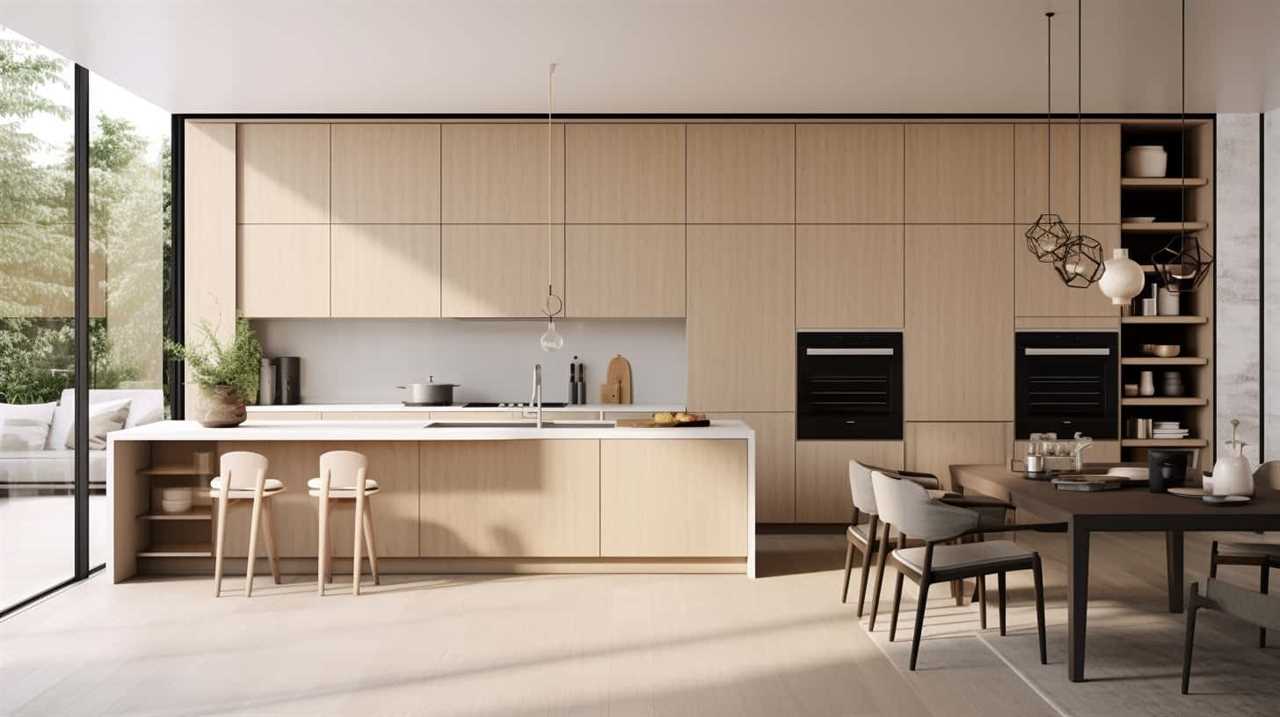
When comparing wireless speaker brands, Bose and Sonos are both renowned for their exceptional sound quality.
The Bose SoundLink Revolve delivers 360-degree sound, ensuring immersive audio no matter where you’re in the room. It also features a durable design and is water-resistant, making it perfect for both indoor and outdoor use.
On the other hand, the Sonos One offers powerful sound and integrates seamlessly with Alexa, allowing you to control your smart home devices with just your voice. It also supports multi-room audio, enabling you to play music in different rooms simultaneously.
Home Automation Hubs
When it comes to home automation, having a reliable hub is essential.
In this discussion, we’ll explore the best home automation hubs that are compatible with Alexa.
We’ll look at their features and benefits, allowing you to make an informed decision for your smart home setup.
Best Home Automation Hubs
We found that the best home automation hubs for Alexa compatibility are those that seamlessly integrate with a variety of smart home devices. These top-rated smart home hubs offer the best home automation features, allowing users to control and monitor their smart devices with ease.
Here are two sub-lists to help you understand the capabilities of these hubs: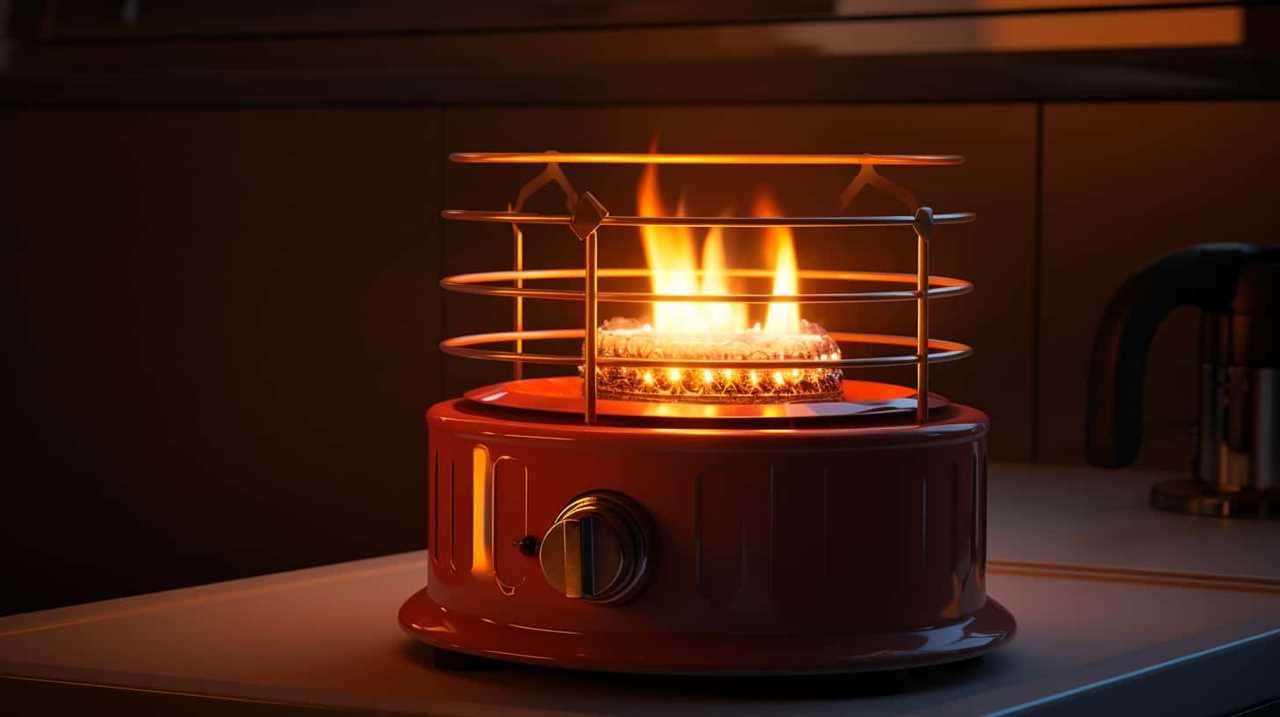
- Wide Device Compatibility:
- These hubs support a wide range of smart devices, including smart lights, thermostats, cameras, and locks.
- They offer easy setup and configuration for various brands, ensuring a seamless integration process.
- Advanced Automation Features:
- These hubs allow users to create custom automation routines, scheduling tasks, and scenarios based on their preferences.
- They offer voice control capabilities, allowing users to control their smart home devices using voice commands through Alexa.
With these top-rated smart home hubs, users can enjoy a fully automated smart home experience, enhancing convenience and efficiency in their daily lives.
Compatibility With Alexa
To ensure seamless integration with Alexa, it’s important to consider the compatibility of home automation hubs. These hubs serve as the central control system for all your smart home devices, allowing you to manage and monitor them in one place.
When choosing a home automation hub, look for models that are compatible with Alexa and offer integration with smart assistants. This compatibility allows you to control your smart home devices using voice commands, bringing the benefits of voice control to your fingertips.
With the integration of Alexa, you can easily turn on lights, adjust thermostats, lock doors, and even play music with a simple voice command. This level of convenience and control is what makes compatibility with Alexa an essential feature for any smart home setup.
Features and Benefits?
Our top 15 Alexa-compatible smart home devices offer a range of features and benefits, including seamless integration with home automation hubs. These devices not only provide convenience and ease of use but also contribute to energy efficiency and offer voice command capabilities.
Here are some key features and benefits of these devices:
- Energy Efficient Technology:
- Smart thermostats allow you to control your home’s temperature remotely, optimizing energy usage and reducing utility bills.
- Smart plugs and switches enable you to monitor and manage the energy consumption of your connected devices, helping you save energy and money.
- Voice Command Capabilities:
- With Alexa integration, you can control these devices using simple voice commands, making it effortless to manage your smart home.
Smart Blinds and Shades
Automate your window coverings with Alexa-compatible smart blinds and shades, effortlessly controlling the amount of natural light in your home. With the power of voice control, you can adjust your blinds and shades to create the perfect ambiance and enhance your privacy. Gone are the days of manually opening and closing them, as these smart devices bring convenience and efficiency to your fingertips.
| Smart Blinds and Shades | Benefits of Voice Control |
|---|---|
| Adjust natural light | Increase energy efficiency |
| Enhance privacy | Simplify daily routines |
| Create the perfect ambiance | Enhance home security |
By integrating smart blinds and shades into your smart home system, you can enjoy a myriad of benefits. Firstly, you can effortlessly adjust the amount of natural light entering your home, allowing you to create a comfortable and well-lit environment. Secondly, by controlling the blinds and shades with your voice, you can increase energy efficiency by minimizing the need for artificial lighting and reducing heat gain or loss.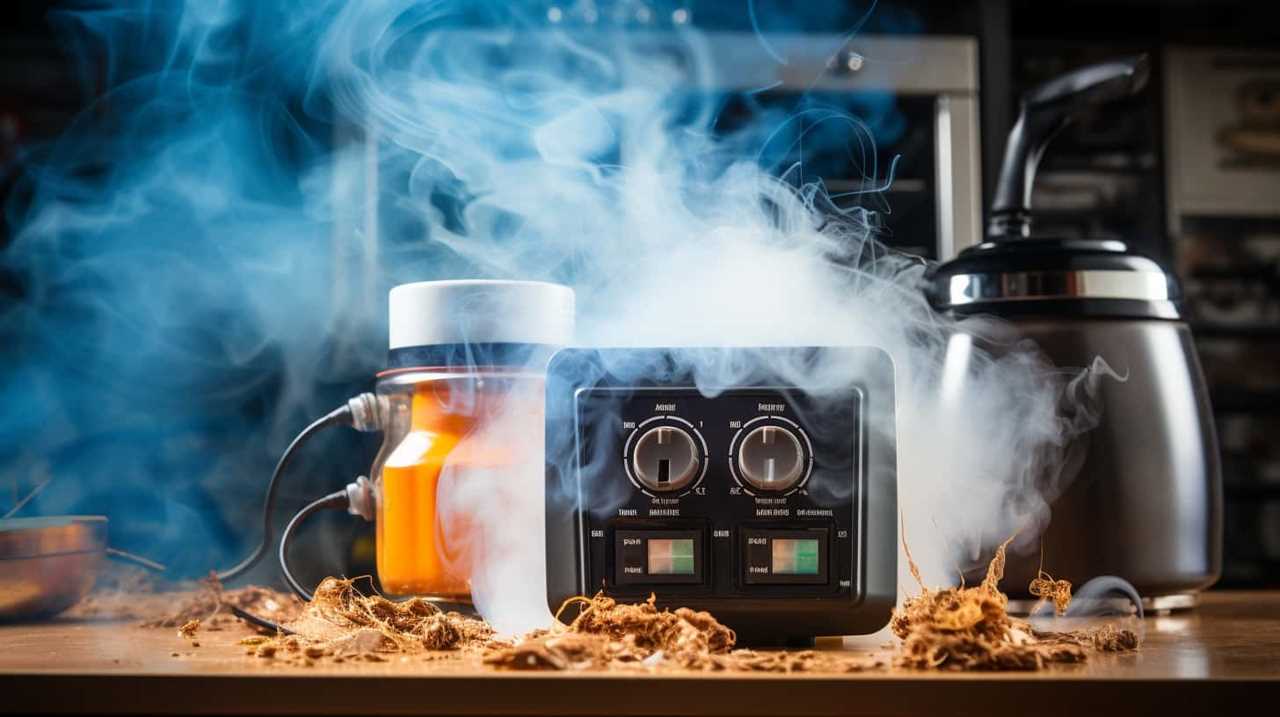
Moreover, using voice control to adjust your blinds and shades enhances your privacy. You no longer need to manually open or close them, as a simple voice command can provide you with the desired level of privacy in any room.
Not only do smart blinds and shades offer convenience, but they also simplify your daily routines. With voice control, you can easily open your blinds in the morning to wake up to natural light or close them in the evening for a cozy atmosphere.
Lastly, integrating smart blinds and shades into your smart home system enhances your home security. By automating the opening and closing of your blinds, you can create the illusion of an occupied home even when you’re away, deterring potential intruders.
Transitioning into the next section about ‘water leak detectors’, we will explore another essential smart home device that can help protect your home from potential water damage.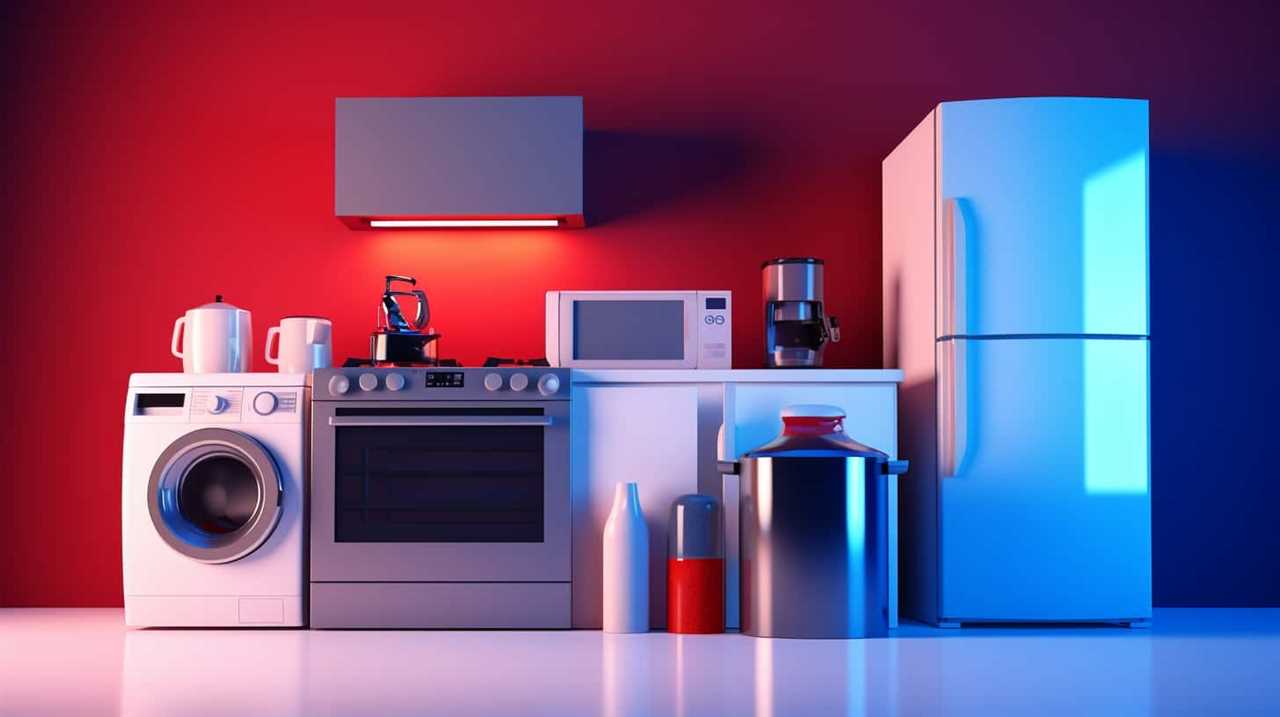
Water Leak Detectors
We use water leak detectors to enhance the security of our smart homes and protect against potential water damage. These devices are designed to detect leaks and send notifications to our smartphones or other connected devices, allowing us to take immediate action and prevent further damage.
Here are two key features of water leak detectors that contribute to effective water leak prevention and water damage mitigation:
- Real-time monitoring: Water leak detectors continuously monitor the area they’re installed in, using advanced sensors to detect any signs of water leakage. They can detect even the smallest amount of water and send alerts to our devices in real-time, ensuring that we’re aware of any potential leaks as soon as they occur.
- Smart automation: Many water leak detectors are compatible with smart home systems like Alexa, allowing us to integrate them into our existing smart home setup. This enables us to automate certain actions based on the detection of a leak, such as shutting off the main water supply or activating water shut-off valves, preventing further water damage and minimizing the need for manual intervention.
Smart Garage Door Openers
Enhancing security and convenience, smart garage door openers offer seamless integration with Alexa-compatible smart home systems. These devices are designed to provide homeowners with greater control and peace of mind when it comes to their garage doors. With the ability to connect to Wi-Fi networks, smart garage door openers allow users to remotely monitor and operate their garage doors using their smartphones or voice commands through Alexa.
In addition to the convenience factor, smart garage door openers also provide enhanced security features. They often come equipped with advanced encryption protocols, ensuring that the communication between the opener and the user’s smartphone or smart home system is secure. Some models even offer real-time notifications, allowing users to receive alerts on their smartphones whenever their garage doors are opened or closed. This can be particularly useful for individuals who want to keep a close eye on their garage’s security.
Furthermore, smart garage door openers can also assist with smart garage door maintenance. They can provide valuable insights into the door’s performance and alert users of any potential issues, such as a malfunctioning sensor or a worn-out garage door spring. By addressing these issues promptly, homeowners can avoid costly repairs and ensure that their garage doors are always in optimal working condition.
Now that we’ve explored the benefits of smart garage door openers, let’s shift our focus to another essential smart home device: robot vacuums.
Robot Vacuums
Let’s dive into the world of automated cleaning with robot vacuums. These smart devices have revolutionized the way we keep our homes clean, offering a range of benefits that make them a popular choice for homeowners.
Here are some of the top benefits of robot vacuums: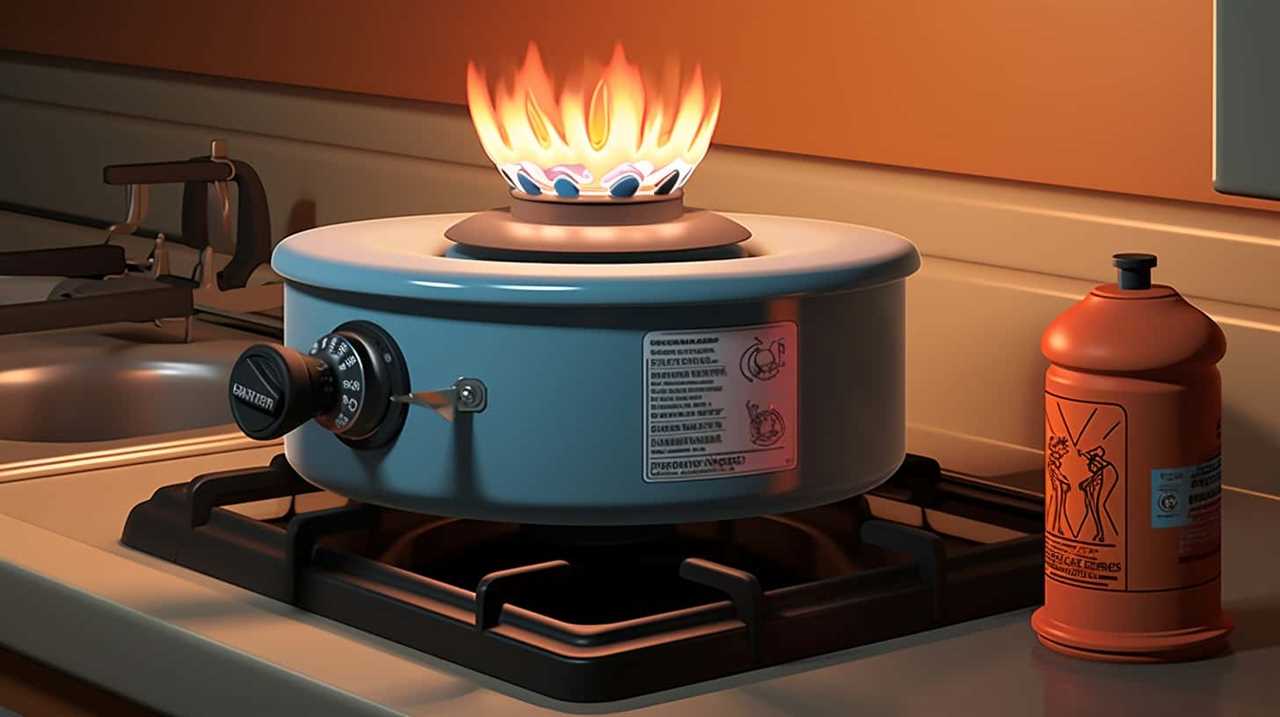
- Convenience: Robot vacuums take the hassle out of cleaning by doing the work for you. With their advanced sensors and mapping capabilities, they can navigate your home, cleaning every nook and cranny while you sit back and relax.
- Time-saving: With a robot vacuum, you can save precious time that would otherwise be spent on manual vacuuming. These devices are programmed to clean efficiently and effectively, ensuring that your floors are spotless in no time.
- Versatility: Robot vacuums are designed to tackle different types of flooring, from carpets to hardwood. They come with various cleaning modes and settings, allowing you to customize the cleaning process to suit your needs.
When it comes to choosing the best robot vacuum, there are several options to consider. Some of the top contenders in the market include:
- iRobot Roomba: Known for its reliable performance and advanced features, the Roomba series offers a range of models to suit different budgets and cleaning needs.
- Eufy RoboVac: This brand offers affordable yet efficient robot vacuums with strong suction power and long battery life.
With their time-saving capabilities and advanced features, robot vacuums have become a must-have for anyone looking to maintain a clean and tidy home effortlessly.
Video Doorbells
When it comes to video doorbells, two key points stand out: security and convenience.
These devices offer the ability to monitor your front door from anywhere, providing added peace of mind and a layer of protection for your home.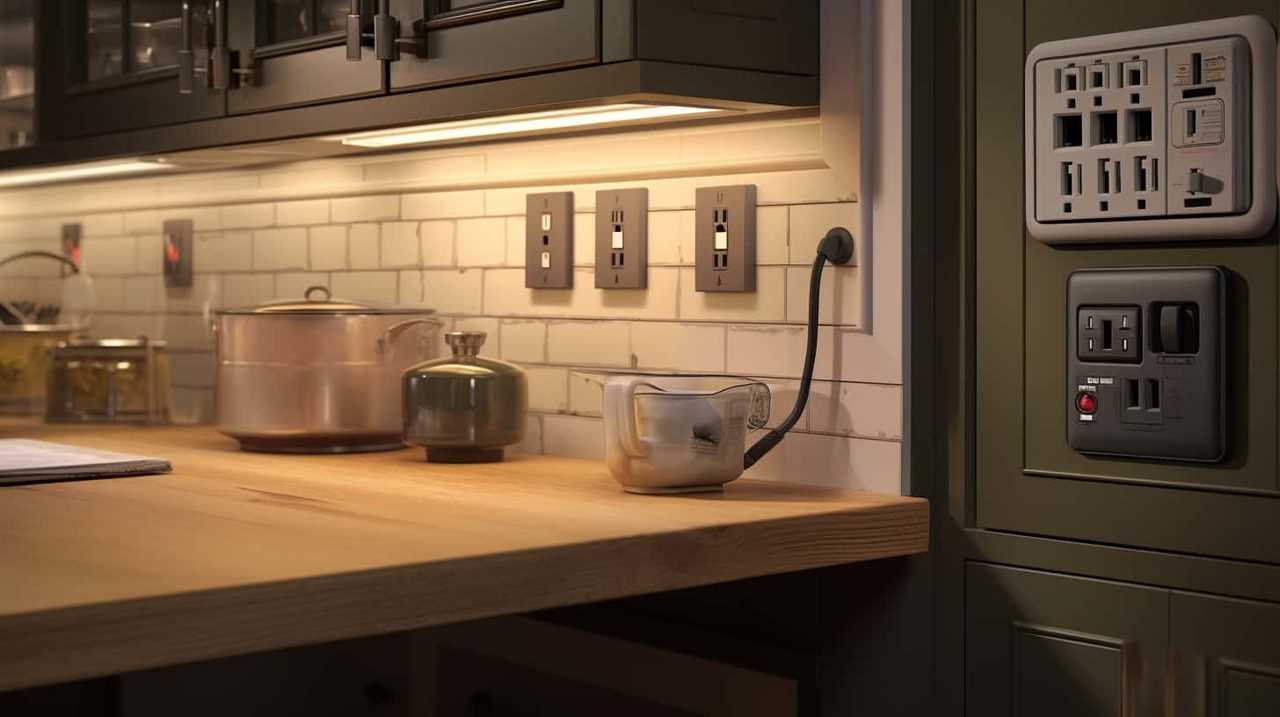
Additionally, with integration capabilities with Alexa, video doorbells can seamlessly fit into your smart home ecosystem, allowing you to control and access them through voice commands.
Security and Convenience
We have found a great article on the top 15 Alexa-compatible smart home devices, and now it’s time to delve into the subtopic of video doorbells, which provide security and convenience.
Video doorbells have gained popularity due to their ability to enhance home security while offering convenient features. Here are some key points to consider:
- Privacy concerns: Many video doorbells come with advanced privacy features, such as customizable motion zones and the ability to disable recording in certain areas. This helps address concerns about recording private spaces.
- Energy efficiency: Video doorbells are designed to be energy-efficient, with low power consumption and the ability to operate on batteries or wired connections. This ensures that the devices can run continuously without consuming excessive energy.
These features make video doorbells an excellent choice for those seeking both security and convenience.
Now, let’s move on to the next section, which discusses the integration of video doorbells with Alexa.
Integration With Alexa
The integration of video doorbells with Alexa enhances the functionality and convenience of home security systems. By connecting your video doorbell to Alexa, you can enjoy the benefits of voice-controlled home automation. With a simple command, you can see who’s at your door without having to physically check. Alexa can display the live feed from your video doorbell on compatible devices such as Echo Show or Fire TV. This integration allows you to conveniently monitor your front door, even when you’re not at home.
Additionally, you can use Alexa to receive notifications when someone rings the doorbell, and even communicate with visitors through two-way audio. The seamless integration between video doorbells and Alexa provides an added layer of security and peace of mind.
Speaking of home automation, let’s now move on to discuss smart irrigation systems.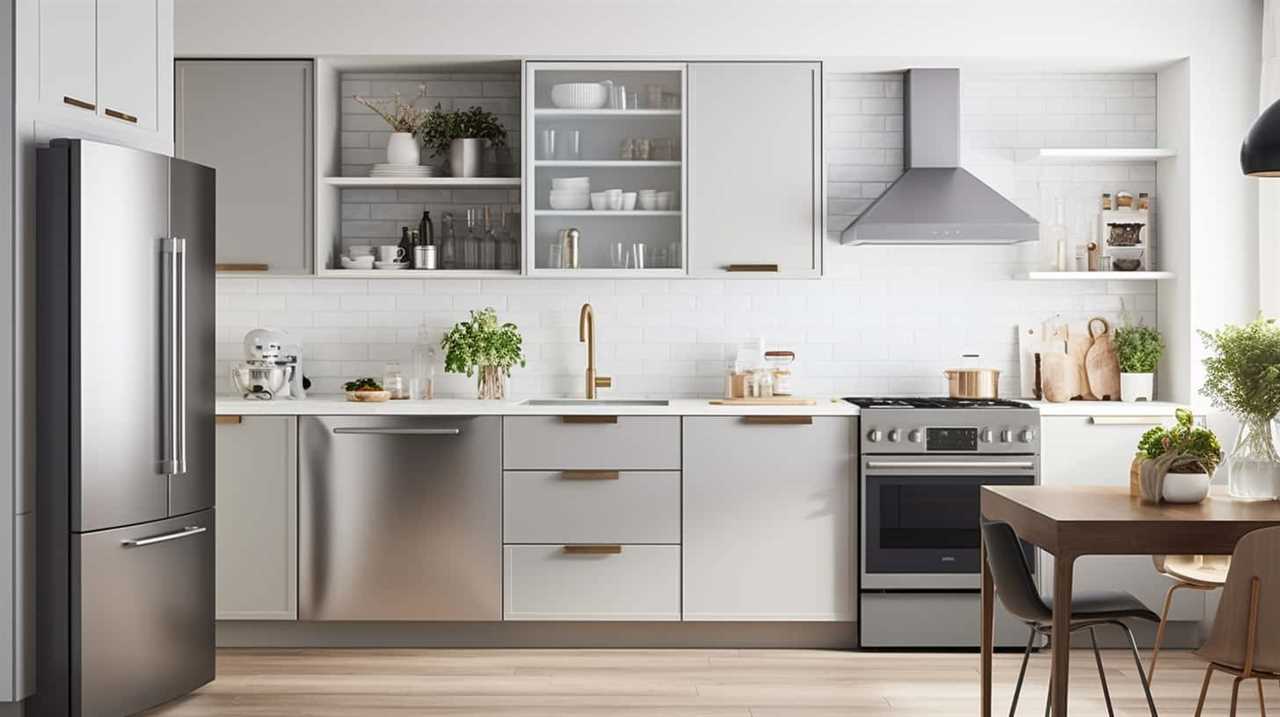
Smart Irrigation Systems
Smart irrigation systems provide efficient and automated watering for your garden or lawn. These systems are designed to optimize water usage, ensuring that your plants receive the right amount of water at the right time.
Here are two ways in which smart irrigation systems can benefit your smart garden and help you achieve efficient water usage:
- Precise Watering: Smart irrigation systems use advanced sensors and weather data to determine the exact amount of water your plants need. By considering factors such as soil moisture, temperature, and humidity levels, these systems can deliver precise amounts of water, eliminating overwatering and reducing water wastage.
- Automated Scheduling: With smart irrigation systems, you can set up automated watering schedules based on your plants’ specific needs. These systems can be programmed to water your garden at optimal times, such as early morning or late evening, when water evaporation is minimal. This helps to conserve water and ensures that your plants receive the necessary hydration for healthy growth.
Smart Home Security Systems
Continuing with efficient water usage in our smart garden, let’s now explore the realm of smart home security systems. In today’s world, ensuring the safety of our homes and loved ones has become a top priority. With advancements in technology, smart home surveillance has made it easier than ever to protect our homes from potential intruders.
Smart home security systems offer a range of features that go beyond traditional security measures. They provide comprehensive home security solutions by integrating various devices and technologies to monitor and protect our homes. These systems often include features such as video surveillance, motion sensors, door/window sensors, and smart locks.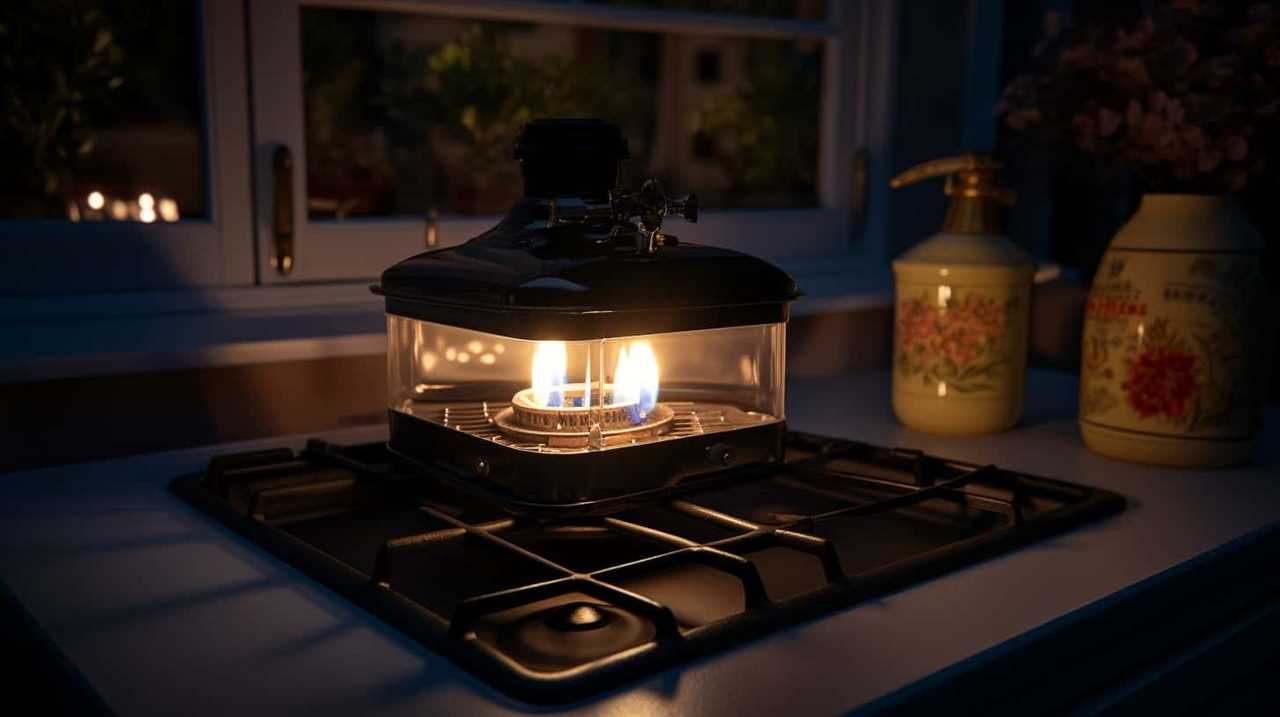
To help you understand the options available, here’s a table summarizing some popular smart home security systems:
| Security System | Key Features |
|---|---|
| Ring Alarm | Wireless security system with optional monitoring |
| Arlo Pro 3 | Wire-free cameras with advanced motion detection |
| SimpliSafe | DIY home security system with professional monitoring |
| Nest Secure | Smart alarm system with built-in Google Assistant |
| ADT Pulse | Professionally installed system with home automation |
These smart home security systems offer a range of features to suit different needs and budgets. Whether you prefer a DIY solution or a professionally installed system, there are options available to enhance the security of your home. With smart home surveillance, you can have peace of mind knowing that your home is protected, even when you’re away.
Smart Kitchen Appliances
Now let’s delve into the world of smart kitchen appliances to further enhance the efficiency and convenience of our homes. With the advent of technology, our kitchens are becoming smarter than ever before.
Here are two must-have smart kitchen appliances that can revolutionize your cooking experience:
- Smart Coffee Makers:
- These intelligent coffee makers can be controlled using voice commands or smartphone apps, allowing you to brew your favorite cup of joe without even leaving your bed.
- Some models even have built-in grinders, so you can enjoy freshly ground coffee every morning.
- They can also be programmed to start brewing at a specific time, ensuring you wake up to the enticing aroma of freshly brewed coffee.
- Smart Refrigerators:
- These high-tech refrigerators are equipped with features that go beyond simple cooling.
- They’ve built-in touchscreens that allow you to browse recipes, create shopping lists, and even order groceries online.
- With cameras inside, you can easily check what’s inside your fridge from anywhere using your smartphone.
- This eliminates the need for multiple trips to the grocery store and helps reduce food waste.
By incorporating smart coffee makers and smart refrigerators into your kitchen, you can streamline your morning routine and manage your groceries more efficiently. These appliances not only save you time and effort but also bring a touch of sophistication to your culinary endeavors.
Can Alexa-Compatible Smart Home Devices also be used for Health and Wellness?
There is a growing trend of using top smart health gadgets, such as Alexa-compatible smart home devices, for health and wellness purposes. These devices can track fitness, monitor dietary habits, and provide health-related reminders. With their advanced capabilities, they offer a convenient and user-friendly way to improve overall well-being.
Frequently Asked Questions
Can Smart Thermostats Be Controlled Remotely Through a Smartphone App?
Yes, smart thermostats can be controlled remotely through a smartphone app. This feature allows users to adjust the temperature of their homes from anywhere, providing convenience and flexibility.
Not only does this enable easy and quick access to heating and cooling controls, but it also promotes energy efficiency by allowing users to optimize their heating settings based on their schedules and preferences.
With remote control thermostats, users can effectively manage and monitor their home’s temperature for a comfortable and energy-efficient environment.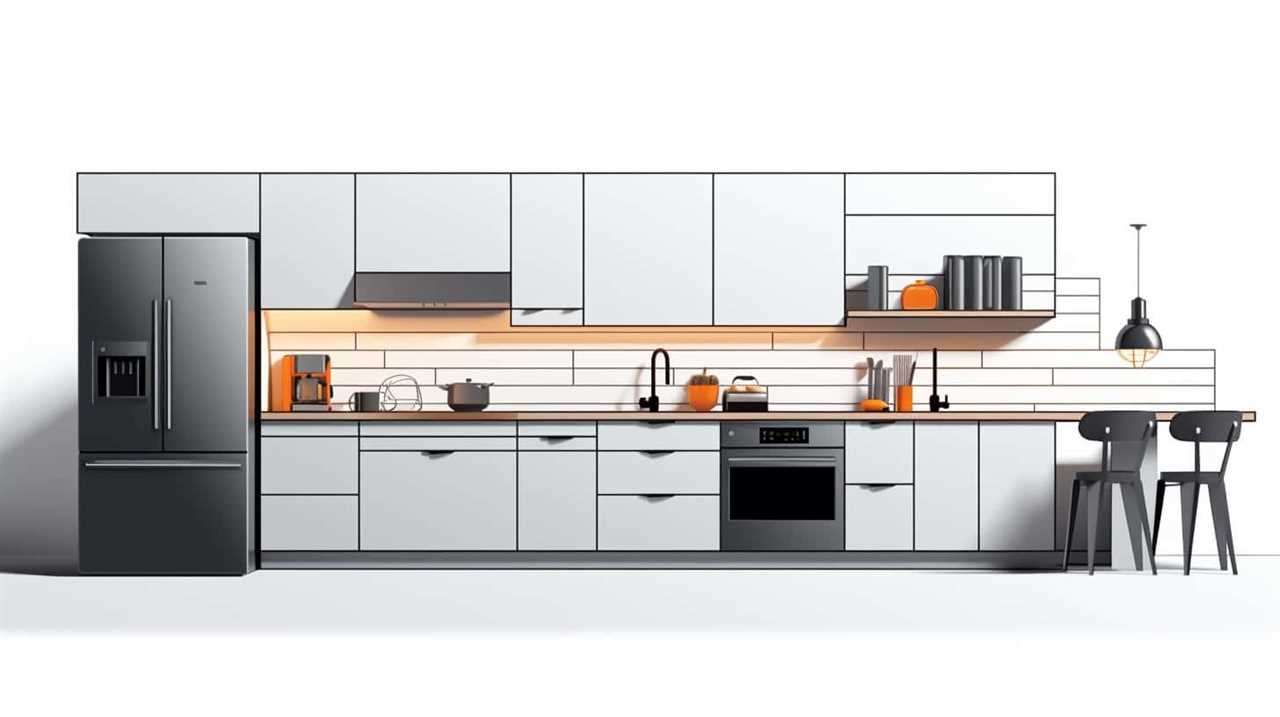
How Do Voice-Controlled Lighting Systems Integrate With Other Smart Home Devices?
Voice-controlled lighting systems enhance the overall smart home experience by providing convenient and hands-free control of the lights in your home.
With just a simple voice command, you can turn on/off lights, adjust brightness, and even change colors.
This not only adds convenience but also improves accessibility for individuals with disabilities, allowing them to easily control the lighting in their homes without needing to physically interact with switches or dimmers.
It truly revolutionizes the way we interact with our homes and enhances the quality of life for everyone.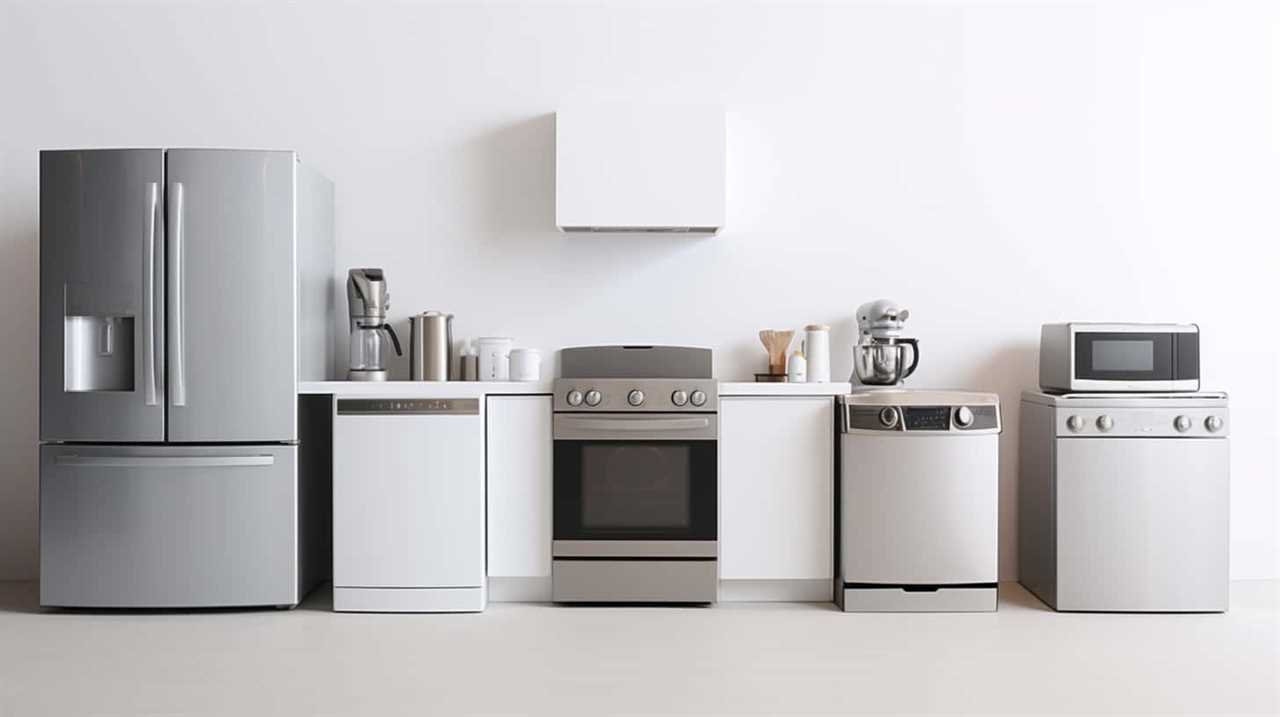
Are Smart Locks and Doorbells Compatible With Multiple Users?
Smart locks and doorbells are indeed compatible with multiple users. They offer the convenience of granting access to different individuals, such as family members or trusted friends. With smart locks, you can assign unique codes or use smartphone apps to provide entry permissions.
Doorbells equipped with video and audio capabilities allow you to see and communicate with visitors remotely. This integration ensures that your home remains secure while granting flexibility in managing access for multiple users.
Can Wi-Fi Enabled Security Cameras Be Accessed and Controlled From Anywhere?
Yes, wi-fi enabled security cameras can be accessed and controlled from anywhere.
With remote access, you can monitor your home or property through live video feeds on your smartphone or computer.
This allows you to keep an eye on your surroundings and ensure the safety of your loved ones and belongings, even when you’re not physically present.
Surveillance monitoring becomes convenient and efficient with these smart cameras, giving you peace of mind and added security.
How Do Smart Plugs and Switches Help in Conserving Energy?
Smart plugs and switches are an ingenious addition to any smart home setup. Not only do they make it incredibly convenient to control your devices remotely, but they also have the added benefit of conserving energy.
By scheduling and automating the usage of your appliances, you can ensure they’re only consuming power when needed. This not only helps reduce your energy bills, but also contributes to a more sustainable and eco-friendly lifestyle.
Conclusion
In conclusion, the world of smart home devices is expanding rapidly, offering us a glimpse into the future of convenient and efficient living.
With smart thermostats, voice-controlled lighting, and Wi-Fi enabled security cameras, our homes are becoming more intuitive and responsive to our needs.
It’s like having a personal assistant who anticipates our every desire and simplifies our daily tasks.
So, why not join the revolution and turn your home into a smart sanctuary?
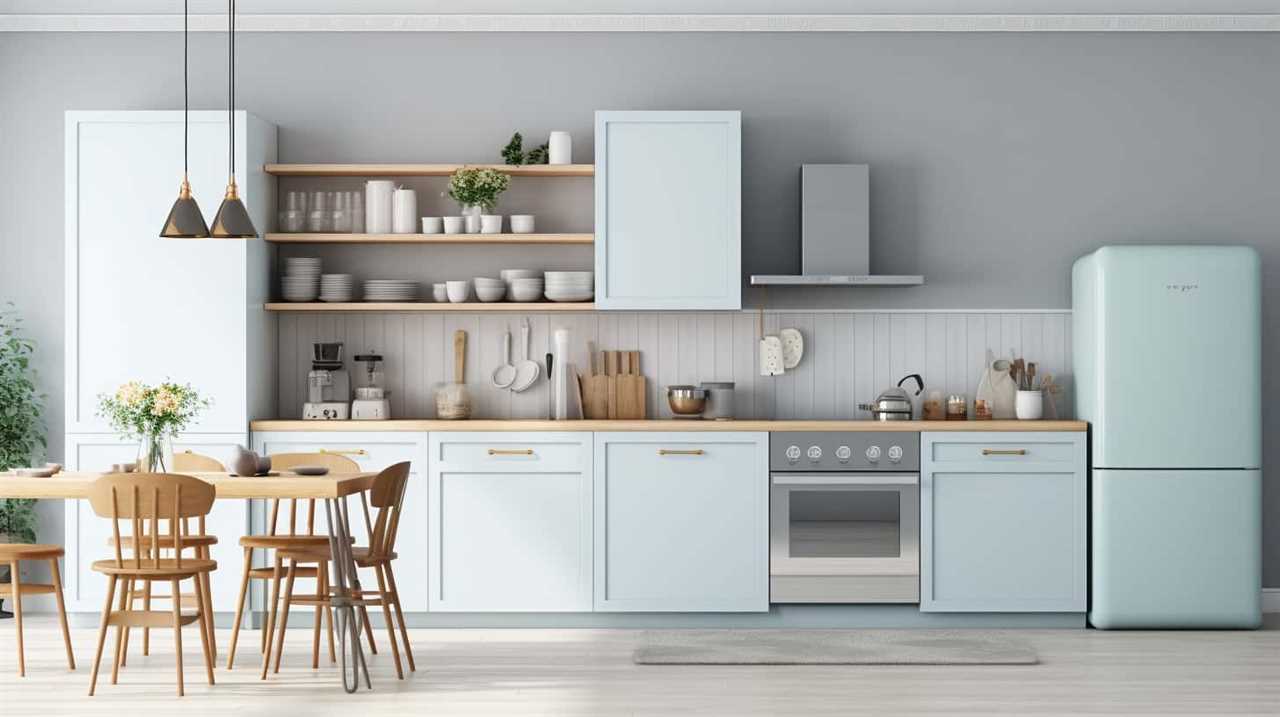
- About the Author
- Latest Posts
Introducing Charles, the Editor in Chief at ByRetreat, whose passion for interior design and editorial excellence elevates every remote workspace to new heights. With his keen eye for detail, impeccable taste, and expertise in design, Charles brings a wealth of knowledge and creativity to the ByRetreat team.
As the Editor in Chief of a renowned lifestyle blog, Charles has honed his skills in curating captivating content and staying up-to-date with the latest trends in interior design. His deep understanding of aesthetics and the power of storytelling through design enables him to create remote workspaces that are not only visually stunning but also rich in personality and meaning.

Are you exhausted from trying to find room for all your small appliances? Your search ends here – we have the ideal solution for you!
In this article, we will explore 12 clever storage solutions that will help you maximize the space in your kitchen or any other area with compact appliances. From wall-mounted appliance shelves to under cabinet racks, pull-out drawers, and over-the-door organizers, we have got you covered.
These innovative storage solutions are designed to keep your appliances neatly organized and easily accessible, allowing you to make the most of your limited space.
So, let’s dive in and discover the secrets to efficient storage for your compact appliances.
Key Takeaways
- Wall-mounted storage solutions, such as shelves and magnetic storage, are effective for compact appliances.
- Under cabinet storage solutions, like appliance racks, maximize space and keep appliances easily accessible.
- Pull-out storage solutions, such as appliance drawers, provide a convenient way to store and access compact appliances.
- Over-the-door storage solutions, such as appliance organizers, offer additional storage space for compact appliances.
Wall-Mounted Appliance Shelves
We love using wall-mounted appliance shelves to maximize storage space and keep our compact appliances easily accessible. These space-saving cabinet designs are a game-changer for those of us who want to make the most out of our small kitchen areas. By utilizing the vertical wall space, we can free up valuable counter space and keep our appliances within arm’s reach.
Wall-mounted appliance shelves are perfect for storing commonly used appliances such as microwaves, blenders, and toasters. They’re designed to securely hold these appliances while still allowing easy access for everyday use. With adjustable shelves and hooks, we can customize the storage area to fit our specific needs.
Not only do wall-mounted appliance shelves help us keep our countertops clutter-free, but they also add a sleek and modern look to our kitchen. They blend seamlessly with our existing cabinetry and create a clean and organized appearance.
In conclusion, wall-mounted appliance shelves are a practical and efficient solution for maximizing storage space in our small kitchens. They provide a designated area for our compact appliances, allowing us to access them easily while keeping our countertops clear.
Now, let’s move on to the next section and explore the benefits of under cabinet appliance racks.
Under Cabinet Appliance Racks
To further optimize storage space and maintain accessibility, another ingenious solution for compact appliances is the utilization of under cabinet appliance racks. These racks provide a hidden and efficient way to store your appliances, keeping them easily accessible while freeing up valuable counter space.
Here are three reasons why under cabinet appliance racks are a must-have for any kitchen:
- Maximizing Space: With limited counter space, it’s important to make the most of every square inch. Under cabinet appliance racks allow you to store your appliances out of sight, freeing up valuable countertop real estate for meal preparation or other kitchen activities.
- Easy Accessibility: Tired of rummaging through cabinets or cluttered countertops to find the appliance you need? Under cabinet racks keep your appliances organized and easily accessible. With a simple pull or slide, you can retrieve the appliance you need without any hassle.
- Hidden Storage: Under counter appliance storage provides a sleek and clutter-free look to your kitchen. By concealing your appliances behind cabinet doors, you create a clean and streamlined appearance, adding to the overall aesthetics of your space.
With under cabinet appliance racks, you can efficiently store your appliances while keeping them hidden from view. But, if you’re looking for even more convenience and accessibility, let’s explore the next section on pull-out appliance drawers.
Pull-Out Appliance Drawers
Once installed, pull-out appliance drawers offer a convenient and space-saving solution for storing compact appliances in the kitchen. These drawers are designed to be easily accessible, allowing you to effortlessly retrieve and store your appliances without the need for heavy lifting or reaching into deep cabinets.
To give you an idea of the options available, here is a comparison table showcasing some popular pull-out appliance drawers and their features:
| Drawer Model | Mounting Type | Dimensions (in inches) |
|---|---|---|
| Drawer A | Wall mounted | 24 x 15 x 18 |
| Drawer B | Wall mounted | 30 x 15 x 18 |
| Drawer C | Wall mounted | 36 x 15 x 18 |
These drawers can be easily installed on the wall, taking up minimal space and leaving your countertops clutter-free. They come in various sizes to accommodate different appliances and can be customized to suit your specific needs.
Over-The-Door Appliance Organizers
An over-the-door appliance organizer is a convenient storage solution for compact appliances. Here are three reasons why you should consider using one:
- Maximize Space: The over-the-door design allows you to utilize the often overlooked space behind your pantry or cabinet doors. By utilizing vertical storage solutions, you can free up valuable countertop or cabinet space for other items.
- Easy Access: With an over-the-door appliance organizer, you can keep your compact appliances within reach while maintaining a clutter-free countertop. No more digging through cabinets or rearranging items to find what you need. Everything is easily visible and accessible.
- Versatile Storage: These organizers aren’t limited to just kitchen appliances. You can also use them to store cleaning supplies, toiletries, or other small items. The adjustable shelves and pockets make it easy to customize the storage space according to your needs.
By incorporating an over-the-door appliance organizer into your kitchen or pantry, you can make the most of your available space while keeping your compact appliances easily accessible.
Now let’s explore another space-saving solution for storing appliances: magnetic appliance storage solutions.
Magnetic Appliance Storage Solutions
Now, let’s explore how magnetic appliance storage solutions can provide an innovative way to store compact appliances.
Magnetic appliance hooks are small, yet powerful, magnets that can hold various compact appliances securely to the side of your refrigerator or any other magnetic surface. These hooks are versatile and can support the weight of appliances such as toasters, blenders, or even coffee makers. By utilizing the vertical space on your refrigerator, you can free up valuable countertop or cabinet space.

Innovative appliance holders are specifically designed to store and organize compact appliances. These holders come in various forms, including wall-mounted racks or shelves, and are often made of sturdy materials like stainless steel or plastic. They provide a convenient and stylish solution for keeping your appliances neatly stored while still within reach.
Both magnetic appliance hooks and innovative appliance holders offer a practical and efficient storage solution for compact appliances. They allow you to declutter your kitchen countertops, maximize your storage space, and keep your appliances easily accessible whenever you need them.
With these storage solutions, you can create a functional and organized kitchen that promotes efficiency and mastery in your culinary pursuits.
Stackable Appliance Containers
We frequently use stackable appliance containers to efficiently store and organize compact appliances in our kitchen. These containers are designed to maximize space and keep our appliances easily accessible.
Here are three reasons why stackable appliance containers are a great addition to any kitchen:
- Space-saving cabinet designs: Stackable appliance containers are specifically designed to fit neatly into cabinets or on countertops, making the most of limited space in our kitchen. With their slim profiles and stacking capabilities, these containers allow us to organize and store our appliances without cluttering our countertops or taking up valuable cabinet space.
- Easy access and visibility: Stackable appliance containers often feature transparent lids or clear sides, allowing us to easily see the contents inside without having to open each container. This makes it simple to locate the appliance we need, saving us time and frustration when cooking or baking.
- Versatility and adaptability: Stackable appliance containers come in a variety of sizes and shapes, ensuring that we can find the perfect container to fit each appliance. From small containers for handheld mixers to larger ones for blenders or food processors, these containers can accommodate appliances of all sizes. Additionally, their stackable design allows us to customize the arrangement based on our specific needs and available space.
Corner Appliance Storage Units
As we explore clever storage solutions for compact appliances, one option that stands out is utilizing corner appliance storage units. These innovative space-saving solutions are perfect for maximizing the storage potential in your kitchen or any other area where you have limited space.
Corner appliance storage units are designed to fit into the corners of your cabinets or countertops, making use of the often-unused space in these areas. These units typically feature shelves or compartments that can hold appliances such as blenders, toasters, or coffee makers. The shelves are adjustable, allowing you to customize the unit to fit your appliances and maximize storage efficiency. Some units even come with built-in power outlets, making it easier to keep your appliances plugged in and ready to use.
With corner appliance storage units, you can keep your countertop clutter-free and organized. By storing your appliances in these units, you can free up valuable counter space for meal preparation and other activities. You can also easily access your appliances when you need them, as they’ll be conveniently stored in one place.

Appliance Storage Carts
Moving on to the next storage solution, let’s explore the convenience of appliance storage carts. These portable solutions offer multi-functional designs that can greatly enhance the organization and usability of your compact appliances.
Here are three reasons why appliance storage carts are a must-have for any home:
- Versatile Storage Options: Appliance storage carts come with various compartments and shelves, allowing you to store not only your appliances but also their accessories and additional kitchen tools. With designated spaces for each item, you can easily locate and access everything you need while cooking or baking.
- Easy Mobility: One of the key advantages of appliance storage carts is their portability. Equipped with wheels, these carts can be effortlessly moved around your kitchen, enabling you to position your appliances wherever they’re most convenient. Whether you need to create extra counter space or bring your appliances closer to the power source, these carts make it a breeze.
- Multi-Purpose Use: Appliance storage carts aren’t limited to just storing appliances. They can also serve as an additional work surface or a serving station during parties and gatherings. By utilizing their multi-functional capabilities, you can maximize the functionality of your kitchen space.
Appliance storage carts offer a practical and efficient solution for organizing and utilizing your compact appliances. With their portable nature and multi-functional designs, these carts can transform the way you work in your kitchen, making every cooking experience a breeze.
Slim-Profile Appliance Cabinets
When it comes to maximizing small kitchen spaces, slim-profile appliance cabinets are a game-changer.
These space-saving cabinet designs offer efficient organization solutions that help keep your kitchen clutter-free.
With slim-profile appliance cabinets, you can make the most of your available space while still having all your appliances easily accessible.
Space-Saving Cabinet Designs
To maximize space in your kitchen, we recommend incorporating space-saving cabinet designs, specifically slim-profile appliance cabinets. These innovative storage solutions are perfect for compact kitchens where every inch counts. Here are three reasons why you should consider slim-profile appliance cabinets:
- Optimal Use of Vertical Space: Slim-profile cabinets are designed to make the most of your kitchen’s vertical space. They’re taller and narrower than traditional cabinets, allowing you to store more items without taking up valuable floor space.
- Customizable Storage Options: These cabinets come with adjustable shelves and dividers, making it easy to create a storage system that fits your needs. Whether you need space for spices, canned goods, or baking supplies, slim-profile cabinets can be customized to accommodate your pantry items.
- Streamlined Aesthetic: Slim-profile appliance cabinets have a sleek and modern look that adds a touch of sophistication to your kitchen. They create a clean and organized appearance, giving your kitchen a polished and professional feel.
Efficient Organization Solutions
In addition to their space-saving design, slim-profile appliance cabinets also offer efficient organization solutions for compact kitchens. These cabinets are specifically designed to maximize storage space and keep everything organized and easily accessible. With their narrow profile, they can fit into tight spaces and make the most out of every inch of your kitchen.
One of the key features of slim-profile appliance cabinets is their efficient storage solutions. They often come with built-in shelves, drawers, and compartments that allow you to neatly store your appliances, utensils, and other kitchen essentials. These cabinets can also include adjustable shelving, allowing you to customize the storage space according to your needs.
Furthermore, these cabinets offer space-saving organization. They can be installed in strategic locations, such as next to the refrigerator or oven, making it convenient to access your appliances while cooking. Additionally, their sleek design adds a stylish touch to your kitchen while optimizing functionality.
Maximizing Small Kitchen Spaces
One key way to maximize small kitchen spaces is by utilizing slim-profile appliance cabinets. These cabinets are designed to fit seamlessly into compact kitchens, providing storage solutions that optimize both functionality and space.
Here are three creative ways to make the most of your small kitchen:
- Utilize vertical space: Install slim-profile appliance cabinets that extend from floor to ceiling. This allows you to maximize storage space without sacrificing valuable square footage.
- Incorporate creative shelving ideas: Opt for adjustable shelves or pull-out shelves to customize your cabinet space. This allows you to efficiently store and access items of various sizes, making the most of every inch.
- Opt for multi-functional cabinets: Choose slim-profile appliance cabinets that serve multiple purposes. For example, you can find cabinets with built-in spice racks or pull-out cutting boards, maximizing functionality while minimizing clutter.
By implementing these strategies, you can create a compact kitchen that feels spacious and organized.
Now, let’s explore another clever storage solution: appliance storage baskets.
Appliance Storage Baskets
We use appliance storage baskets to keep our compact appliances organized and easily accessible. These baskets are a practical solution for storing appliances such as toasters, blenders, and coffee makers. Appliance storage bins come in various sizes and designs, allowing us to choose the one that best fits our kitchen space and aesthetic preferences. These bins are typically made of durable materials such as plastic or metal, ensuring that they can withstand the weight and frequent use of our appliances.
Countertop appliance caddies are another option for organizing our compact appliances. These caddies have compartments and shelves that can hold multiple appliances, making it easy to keep everything in one place. They’re also designed to provide easy access to our appliances, allowing us to quickly grab what we need without having to search through cabinets or cluttered countertops.

Appliance Storage Hooks
Appliance storage hooks provide efficient hanging options for compact appliances, allowing us to maximize space in our kitchens.
These space-saving hooks offer practical storage solutions, keeping our appliances easily accessible while freeing up valuable countertop or cabinet space.
With appliance storage hooks, we can keep our kitchen organized and clutter-free, making our cooking and meal preparation experience more efficient and enjoyable.
Efficient Hanging Options
There are several efficient hanging options available for storing compact appliances, including appliance storage hooks. These space-saving hanging solutions offer innovative appliance storage ideas that can help maximize the use of your limited kitchen space.
Here are three options to consider:
- Magnetic hooks: These hooks can be attached to the side of your refrigerator or any other magnetic surface, allowing you to hang small appliances such as can openers or measuring spoons within easy reach.
- Over-the-door hooks: These hooks can be placed over the top of your cabinet doors, providing a convenient spot to hang lightweight appliances like hand mixers or small blenders. This keeps them off the countertop and frees up valuable workspace.
- Wall-mounted hooks: By attaching hooks to your kitchen walls, you can hang larger appliances like slow cookers or toaster ovens. This not only keeps them organized but also ensures they’re easily accessible whenever you need them.
With these efficient hanging options, you can make the most of your compact kitchen and keep your appliances neatly stored and within arm’s reach.
Space-Saving Appliance Hooks
To make the most of your compact kitchen and keep your appliances neatly stored, consider using space-saving appliance hooks. These innovative hooks provide efficient hanging options for your appliances, helping you save valuable counter and cabinet space.
With appliance hooks, you can easily hang your blender, toaster, or even your coffee maker, keeping them within reach while freeing up your countertops. These hooks are designed to securely hold your appliances in place, ensuring they stay stable and safe.

They’re also versatile and can be installed on walls or inside cabinet doors, allowing you to customize your storage solution based on your kitchen layout.
Practical Storage Solutions
When it comes to practical storage solutions for compact appliances, one option to consider is utilizing appliance storage hooks. These hooks are a simple yet effective way to keep your appliances organized and easily accessible.
Here are three reasons why appliance storage hooks are a practical choice for practical organization:
- Space-saving: By hanging your appliances on hooks, you can free up valuable countertop or cabinet space. This allows you to maximize the use of your kitchen area and keep it clutter-free.
- Easy access: With appliance storage hooks, you can conveniently hang your appliances within reach. This eliminates the need to dig through drawers or cabinets, saving you time and effort when you need to use your appliances.
- Versatility: Appliance storage hooks can be used for a variety of compact appliances, such as blenders, toasters, or even small kitchen gadgets. They provide a flexible storage solution that can adapt to your changing needs.
Appliance Storage Racks
We found an ingenious solution for compact appliances: appliance storage racks. These racks are a creative storage solution that can help maximize space in your kitchen or any other area where you store your appliances.
Appliance storage racks are designed to hold multiple appliances in a compact and organized manner. They typically feature multiple shelves or compartments, allowing you to stack and store your appliances vertically. This not only saves valuable counter space but also makes it easier to access and retrieve your appliances when needed.
Appliance storage racks come in various sizes and designs, catering to different needs and preferences. Some racks are designed specifically for smaller appliances like toasters and blenders, while others can accommodate larger appliances such as mixers and food processors. Additionally, some racks are designed to be wall-mounted, further maximizing space in your kitchen.
When choosing an appliance storage rack, consider the size and weight of your appliances, as well as the available space in your kitchen. Look for racks that are sturdy and durable to ensure your appliances are securely stored. You may also want to consider racks with adjustable shelves or compartments, allowing you to customize the storage space according to your needs.
Frequently Asked Questions
How Do I Choose the Right Size Wall-Mounted Appliance Shelf for My Compact Appliances?
When choosing a wall-mounted appliance shelf for compact appliances, there are a few factors to consider.

First, think about the size of your appliances and make sure the shelf can accommodate them.
Look for space-saving alternatives that maximize storage without taking up too much room.
Consider the weight capacity of the shelf to ensure it can handle the appliances.
Lastly, make sure the shelf is easy to install and securely mount to the wall.
Can Under Cabinet Appliance Racks Hold Heavy Appliances Securely?
Can under cabinet appliance racks hold heavy appliances securely? Absolutely!
When it comes to safety considerations, under cabinet appliance racks are designed to handle the weight of heavy appliances without compromising stability.
However, if you’re still concerned, there are alternative options available. Consider installing a sturdy wall-mounted shelf or a freestanding storage unit specifically designed for heavy appliances.
These alternatives provide added peace of mind while maximizing your storage space.
Always prioritize safety when it comes to storing your compact appliances.
Are Pull-Out Appliance Drawers Compatible With All Types of Appliances?
Pull-out appliance drawers have their pros and cons. On the positive side, they provide easy access to compact appliances, making them convenient to use. However, they may not be compatible with all types of appliances due to size or weight restrictions.
Alternatives to pull-out drawers for compact appliances include under cabinet appliance racks or wall-mounted shelves. These options can also provide efficient storage solutions while ensuring the compatibility of different appliances.
Can Over-The-Door Appliance Organizers Be Easily Installed Without Any Tools?
Over-the-door appliance organizers can be easily installed without any tools, making them a convenient storage solution.
However, there are pros and cons to consider. On the positive side, they maximize space and keep appliances easily accessible.
On the downside, they may not be as sturdy as other storage options and can potentially damage the door.
Alternatives to over-the-door organizers include pull-out shelves or cabinets specifically designed for appliances.
These alternatives provide more stability and customization options.
Are Magnetic Appliance Storage Solutions Strong Enough to Hold Larger Appliances Securely?
Magnetic appliance storage solutions provide a secure way to hold larger appliances. We’ve found that these solutions are strong enough to support the weight of heavier appliances without any issues.
Additionally, a wall-mounted appliance shelf can also be a practical storage solution for compact appliances. By utilizing these clever storage options, you can maximize your space and keep your appliances organized and easily accessible.
How Can I Use Compact Storage Solutions for Portable Carpet Cleaners?
When looking for efficient and space-saving options for storing portable carpet cleaners, consider compact storage solutions. Wall-mounted shelves or stackable storage bins can help keep portable carpet cleaners organized and easily accessible. Utilizing these compact storage solutions can help maximize space and keep your cleaning equipment in top condition.
Conclusion
In conclusion, these clever storage solutions for compact appliances are like hidden gems in your kitchen. They not only save valuable counter space, but also bring a sense of organization and order to your cooking area.
With these storage options, you can easily access your appliances whenever you need them, while keeping them neatly tucked away when not in use. Say goodbye to clutter and hello to a more efficient and stylish kitchen!
- About the Author
- Latest Posts
Introducing Charles, the Editor in Chief at ByRetreat, whose passion for interior design and editorial excellence elevates every remote workspace to new heights. With his keen eye for detail, impeccable taste, and expertise in design, Charles brings a wealth of knowledge and creativity to the ByRetreat team.
As the Editor in Chief of a renowned lifestyle blog, Charles has honed his skills in curating captivating content and staying up-to-date with the latest trends in interior design. His deep understanding of aesthetics and the power of storytelling through design enables him to create remote workspaces that are not only visually stunning but also rich in personality and meaning.

When exploring the great outdoors, it’s important to keep our food and drinks cool and fresh. That’s why many people rely on solar-powered camping fridges. With a wide variety of options available, how do we determine the best choice?
Fear not, fellow adventurers, for we have compiled 12 tips to help you master the art of selecting the perfect solar-powered camping fridge.
From energy efficiency to cooling performance, battery life to solar charging efficiency, we will guide you through the crucial factors to consider.
We will also delve into size and weight, price and value for money, noise level, and additional features.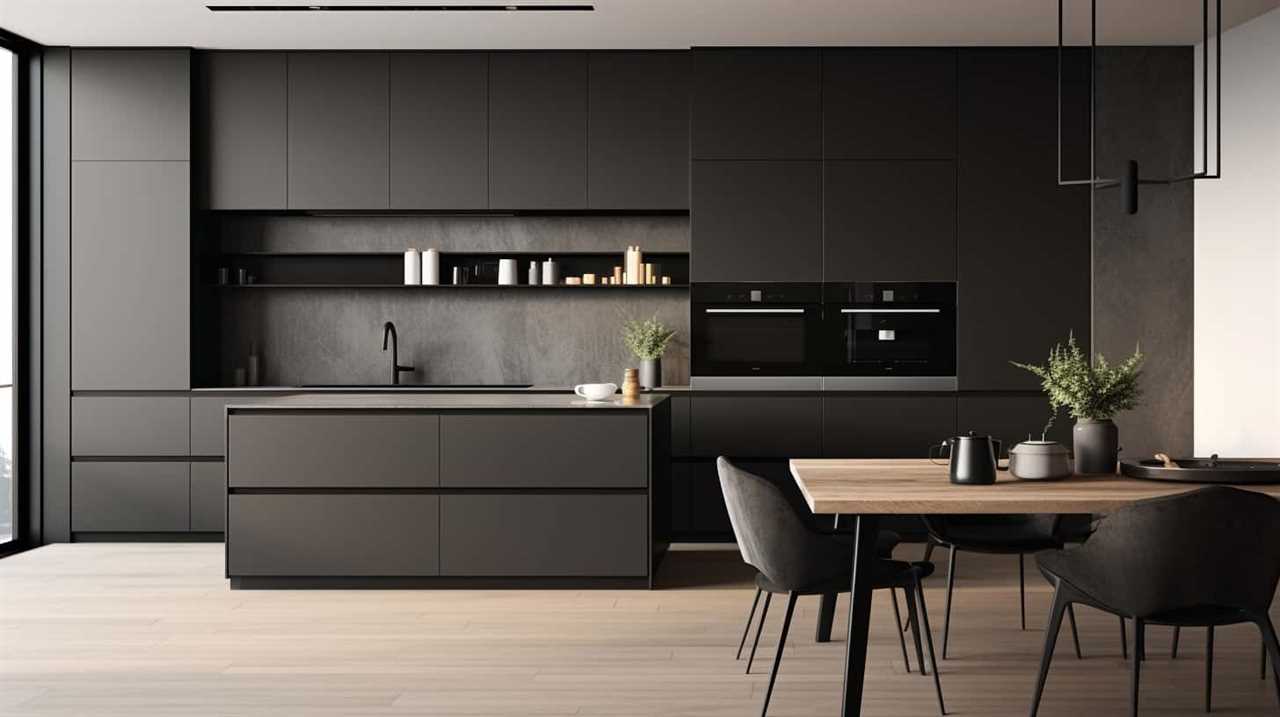
So, let’s embark on this journey together and uncover the secrets behind choosing the ultimate solar-powered camping fridge.
Key Takeaways
- Prioritize energy efficiency when selecting solar-powered camping fridges.
- Choose fridges with advanced insulation technology.
- Consider fridges with efficient LED lighting.
- Ensure compatibility between the fridge and solar panels for optimal performance.
Energy Efficiency
When it comes to selecting solar-powered camping fridges, we should prioritize energy efficiency. This is crucial for maximizing the performance of your fridge while minimizing its impact on the environment. To help you make an informed decision, here are some energy-saving tips and eco-friendly options to consider.
Firstly, look for fridges with high energy efficiency ratings. These ratings indicate how effectively the fridge converts solar energy into cooling power. The higher the rating, the more energy-efficient the fridge will be. Additionally, choose fridges with advanced insulation technology, as this helps to reduce energy loss and maintain a consistent temperature inside the fridge.
Another energy-saving tip is to opt for fridges with adjustable temperature settings. This allows you to set the fridge at the optimal temperature for your needs, preventing unnecessary energy consumption. Additionally, consider fridges with efficient LED lighting instead of traditional incandescent bulbs, as LEDs consume less energy and have a longer lifespan.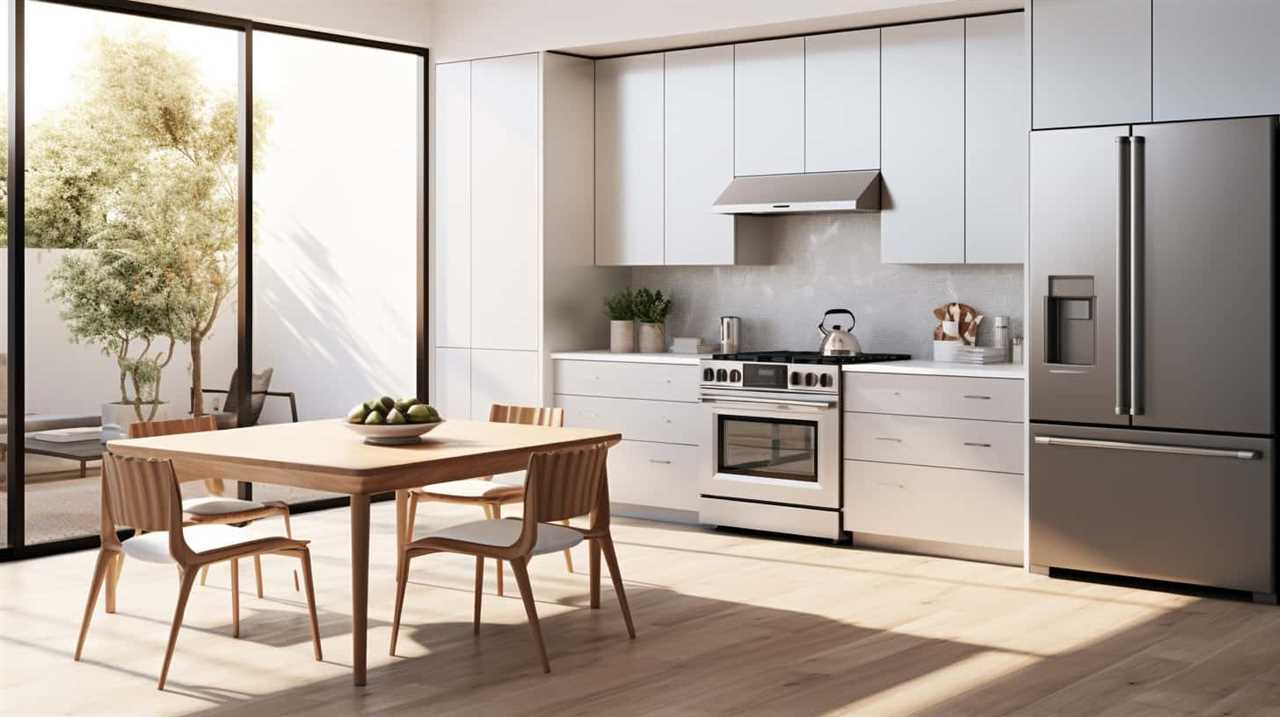
When it comes to eco-friendly options, consider fridges made from sustainable materials and those that are free from harmful chemicals. Look for certifications such as Energy Star and RoHS compliance, which ensure that the fridge meets strict environmental standards. These certifications not only guarantee energy efficiency but also reduce the appliance’s overall carbon footprint. Choosing the best refrigerator and freezer units with advanced technology, such as adjustable temperature controls and eco-friendly refrigerants, can further enhance sustainability. Additionally, prioritizing brands with a commitment to ethical manufacturing practices ensures a greener choice.
In conclusion, prioritizing energy efficiency is essential when choosing a solar-powered camping fridge. By following these energy-saving tips and opting for eco-friendly options, you can enjoy the convenience of a fridge while minimizing your environmental impact.
Now, let’s move on to the next section about power capacity and how to choose the right size for your camping needs.
Power Capacity
To continue our exploration of solar-powered camping fridges, let’s now delve into the important aspect of power capacity.
When choosing a solar-powered camping fridge, it’s crucial to consider the power output and solar panel compatibility.
The power capacity of a fridge determines how efficiently it can operate on solar power. It’s measured in watt-hours (Wh) and represents the amount of energy the fridge can consume over a specific period of time. The higher the power capacity of the fridge, the longer it can run on solar power without needing to be recharged.
When evaluating power capacity, it’s essential to consider the power output of the solar panels you plan to use. The fridge and solar panels must be compatible to ensure optimal performance. It’s recommended to choose a fridge with a power capacity that matches or exceeds the power output of your solar panels. This will ensure that your fridge can be powered effectively and efficiently in outdoor settings.
Now that we’ve explored the importance of power capacity, let’s move on to the next crucial aspect to consider when choosing a solar-powered camping fridge: size and weight.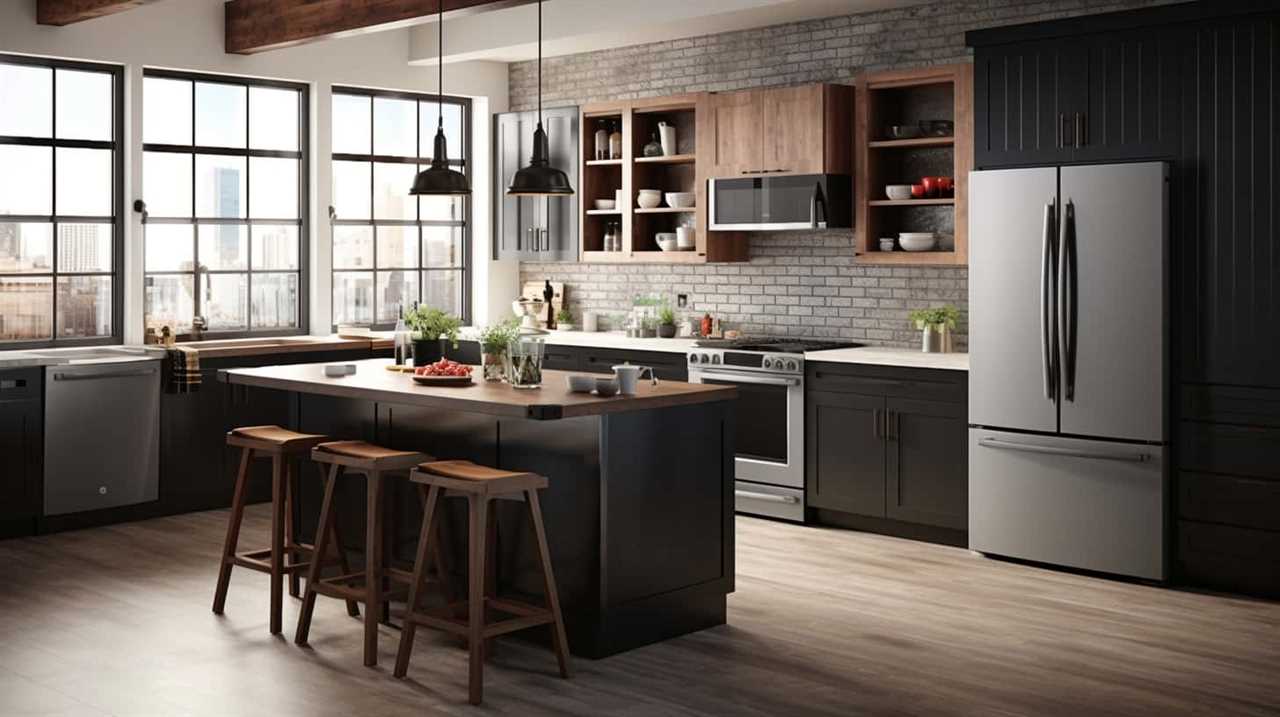
Size and Weight
We need to consider the size and weight of the camping fridge when choosing a solar-powered option. The portability of the fridge is crucial for outdoor activities, so it should be compact and lightweight.
Here are three reasons why size and weight matter when selecting a solar-powered camping fridge:
- Easy transportation: A portable camping fridge should be easy to carry and transport. It should fit comfortably in your vehicle without taking up too much space. Look for fridges that are designed to be lightweight, making them easy to move around and carry on camping trips.
- Convenient storage: The size of the fridge determines its storage capacity. Consider how much food and beverages you need to store during your camping trips. Opt for a fridge with ample storage space that can accommodate your needs. Keep in mind that larger fridges might be heavier and more challenging to transport.
- Energy efficiency: Smaller fridges tend to be more energy-efficient, which is essential when relying on solar power. They require less energy to cool down and maintain the desired temperature, making them ideal for camping trips where power sources may be limited.
Cooling Performance
When choosing a solar-powered camping fridge, it’s crucial to consider the cooling performance. Two key aspects to look at are the energy efficiency ratings and the temperature control options.
Energy efficiency ratings indicate how well the fridge can maintain low temperatures while using minimal power.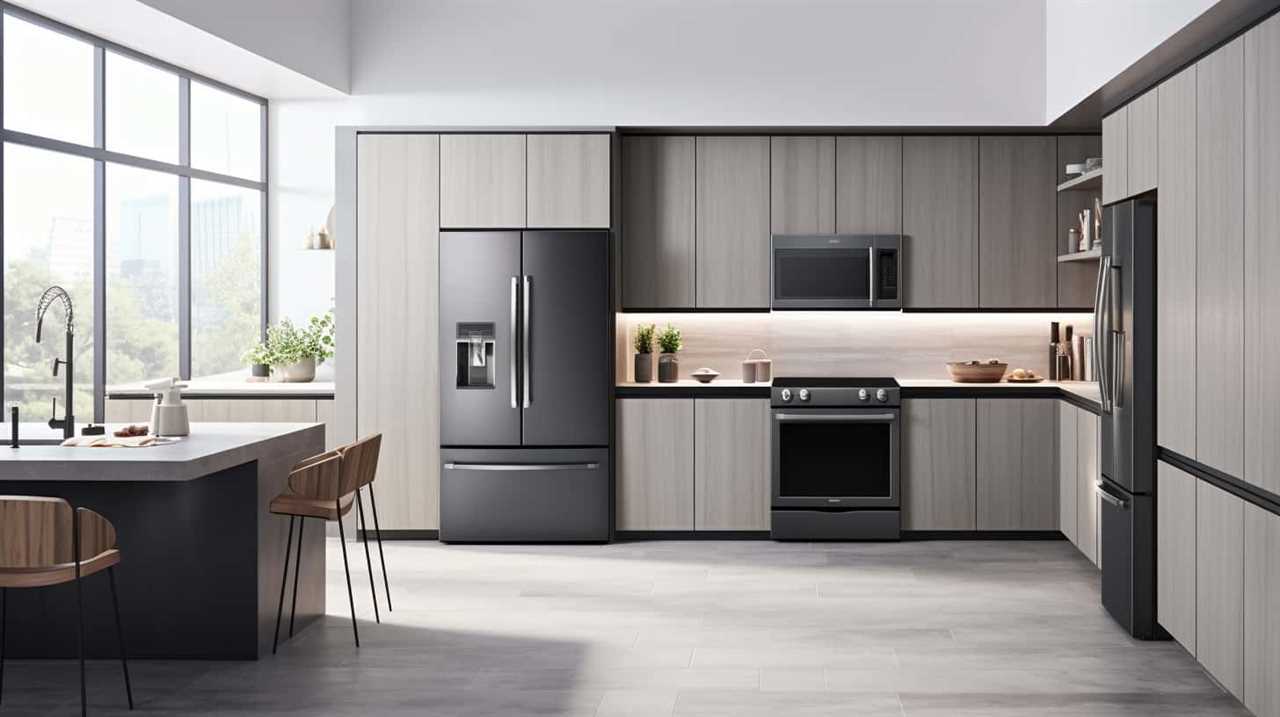
Temperature control options allow you to adjust the cooling settings based on your specific needs.
Energy Efficiency Ratings
Our camping fridge’s energy efficiency ratings greatly impact its cooling performance. When choosing a solar-powered camping fridge, it’s important to consider its energy consumption and eco-friendly options. Here are some key points to keep in mind:
- Energy consumption: Look for fridges with high energy efficiency ratings, as they’ll consume less power and help prolong your battery life during camping trips.
- Eco-friendly options: Consider fridges that use environmentally friendly refrigerants and materials, such as those free from CFCs and HCFCs, to reduce their impact on the environment.
- Solar compatibility: Ensure that the fridge is designed to work efficiently with solar power systems, allowing you to harness the sun’s energy and minimize your reliance on other power sources.
By selecting a camping fridge with excellent energy efficiency ratings and eco-friendly features, you can enjoy optimal cooling performance while minimizing your environmental footprint.
Now, let’s move on to discussing temperature control options.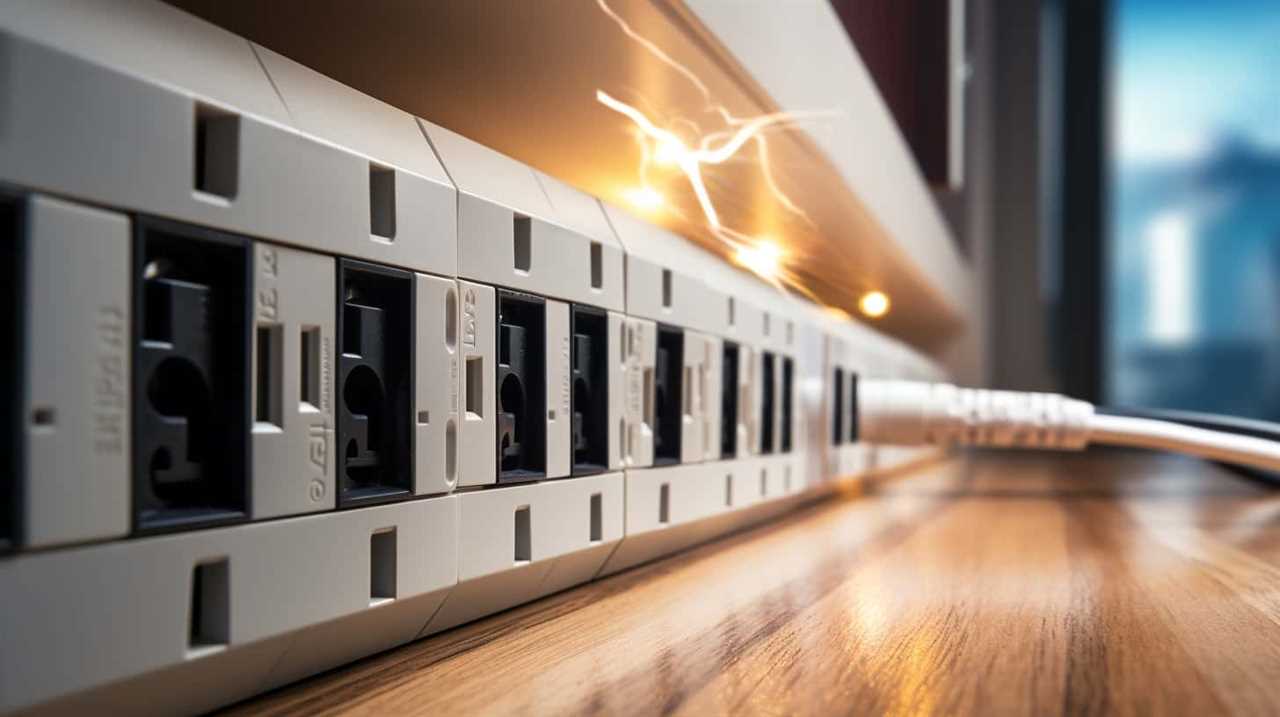
Temperature Control Options
To ensure optimal cooling performance, it’s essential to consider the temperature control options when selecting a solar-powered camping fridge.
One important aspect to look for is the thermostat technology used in the fridge. A high-quality solar-powered camping fridge will have a precise and efficient thermostat that allows you to set and maintain the desired temperature inside. This ensures that your food and beverages stay fresh and cool without freezing.
Additionally, a good thermostat will also help minimize power consumption by regulating the fridge’s compressor cycles based on the temperature settings. This means that the fridge will only work as much as necessary, reducing energy waste and prolonging the lifespan of your solar power system.
Battery Life
When it comes to solar-powered camping fridges, battery life is a crucial factor to consider. To optimize battery efficiency, it’s important to choose a fridge that has a power management system in place, allowing it to adjust energy consumption based on cooling needs.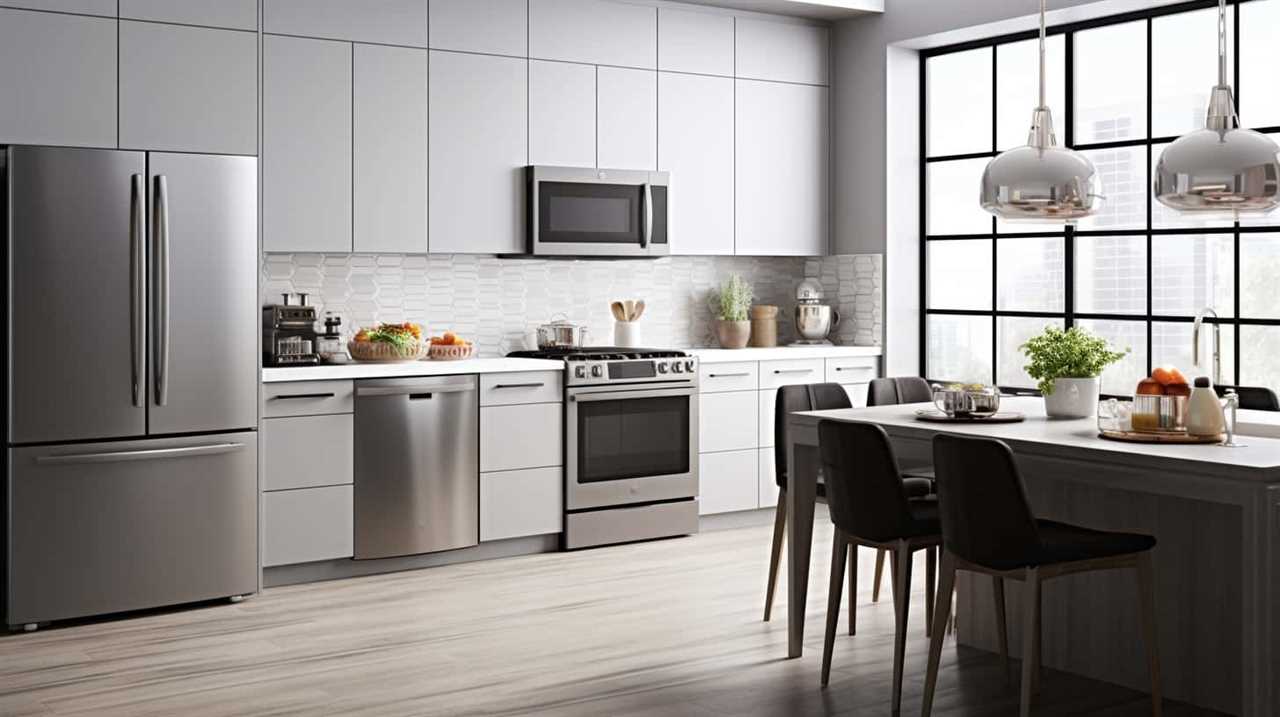
Additionally, selecting a fridge with a long-lasting power storage capacity ensures that it can operate for extended periods without requiring recharging.
Optimizing Battery Efficiency
One key factor in optimizing battery efficiency for solar-powered camping fridges is maximizing the use of available energy. To achieve this, it’s important to consider certain aspects such as battery maintenance and solar panel compatibility.
Here are some practical tips to help you optimize your battery efficiency:
- Regular Battery Maintenance: Regularly check and clean the battery terminals to ensure proper contact and reduce energy loss. Additionally, keep an eye on the battery’s water levels and top up as needed to prevent damage.
- Efficient Solar Panel Compatibility: Ensure that your solar panel is compatible with your camping fridge’s battery. This will ensure that the panel can efficiently charge the battery and maximize energy conversion.
- Optimal Charging Conditions: Place your solar panel in a location that receives maximum sunlight exposure throughout the day. Additionally, angle the panel towards the sun to optimize solar absorption and improve charging efficiency.
Long-Lasting Power Storage
We recommend using a high-capacity battery to ensure long-lasting power storage for your solar-powered camping fridge. The longevity of charge is crucial when you’re out in the wilderness with limited access to electricity. A high-capacity battery will provide you with a longer operating time, allowing you to keep your food and beverages cold for extended periods.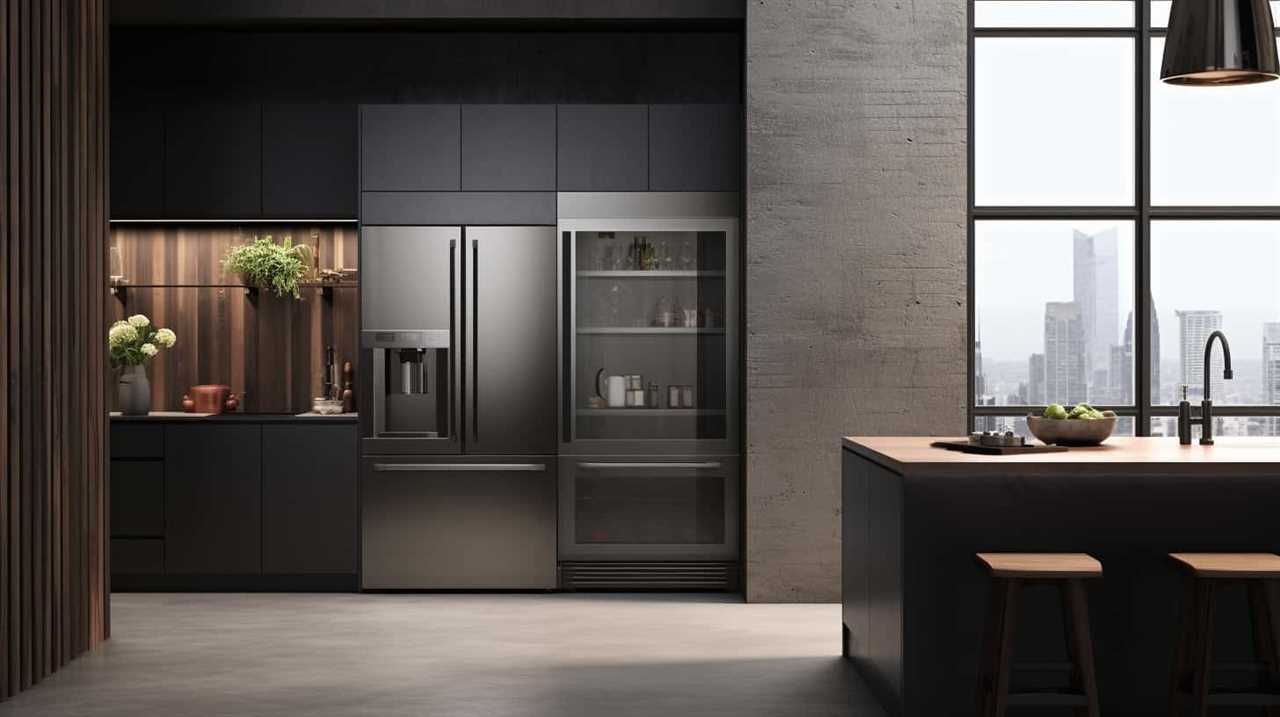
When choosing a battery, consider its compatibility with solar panels. Ensure that the battery you select is compatible with the solar panel system you plan to use. This will ensure efficient charging and optimal performance of your camping fridge.
Durability and Build Quality
For our solar-powered camping fridges, the durability and build quality are essential factors to consider. When it comes to choosing a fridge that can withstand the rigors of outdoor adventures, durability testing and construction materials are paramount. Here are three key points to keep in mind:
- Durability Testing: Look for fridges that have undergone rigorous durability testing. This ensures that they can withstand vibrations, bumps, and shocks that are common during camping trips. Look for certifications such as IPX ratings, which indicate the degree of protection against water and dust ingress.
- Construction Materials: The materials used in the construction of the fridge play a significant role in its durability. Opt for fridges made from high-quality materials such as stainless steel or rugged plastic. These materials aren’t only sturdy but also resistant to corrosion and impact.
- Reinforced Hinges and Latches: The hinges and latches of the fridge need to be robust and secure to withstand constant opening and closing. Look for fridges that feature reinforced hinges and latches, as they’re less likely to break or loosen over time.
Temperature Control
When choosing a solar-powered camping fridge, it’s important to consider its temperature control capabilities. Three key points to keep in mind are energy efficiency ratings, thermostat accuracy, and cooling capacity.
Energy efficiency ratings determine how much power the fridge consumes, while thermostat accuracy ensures precise temperature control. Cooling capacity determines how quickly and effectively the fridge can cool down your food and beverages.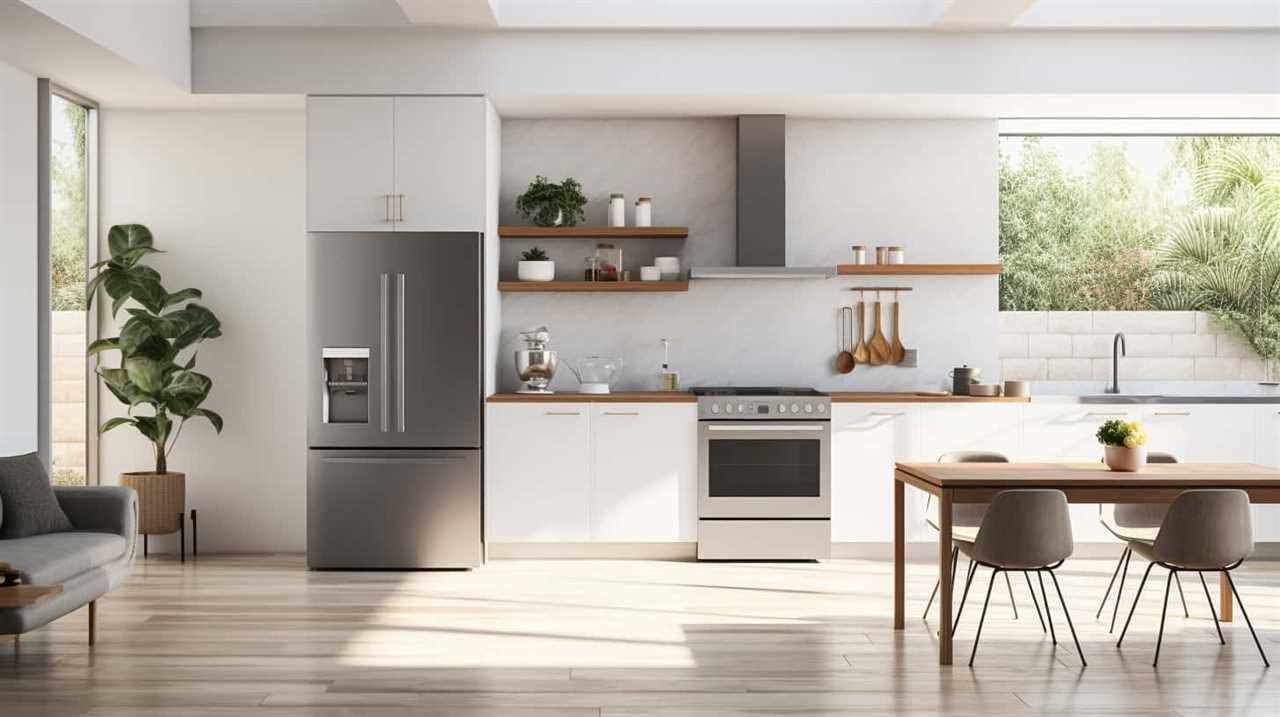
Considering these points will help you select a camping fridge that meets your temperature control needs during your outdoor adventures.
Energy Efficiency Ratings
To ensure optimal energy efficiency in solar-powered camping fridges, it’s crucial to consider the temperature control’s energy efficiency ratings. When choosing a fridge, here are some key factors to keep in mind:
- Energy saving features: Look for fridges that have advanced insulation and seals to minimize heat transfer and reduce energy consumption.
- Sustainability benefits: Consider fridges that use eco-friendly refrigerants and materials, such as those with low global warming potential (GWP) and zero ozone depletion potential (ODP).
- Temperature control accuracy: Opt for fridges with precise temperature control settings to ensure your food stays at the right temperature without unnecessary energy wastage.
Thermostat Accuracy Importance
Our top priority when selecting a solar-powered camping fridge is the thermostat accuracy. It’s crucial to have a fridge that can accurately maintain the desired temperature, especially when storing perishable items. To ensure precise temperature control, it’s important to consider the thermostat calibration of the fridge.
A well-calibrated thermostat will accurately read and maintain the chosen temperature, preventing any fluctuations that could compromise the freshness and safety of your food. Additionally, the temperature range that the fridge can achieve is essential. Look for a fridge that offers a wide temperature range, allowing you to adjust it according to your specific needs.

By prioritizing thermostat accuracy and considering the temperature range, you can ensure that your solar-powered camping fridge will effectively meet your cooling requirements.
Now, let’s move on to the next section and discuss cooling capacity considerations.
Cooling Capacity Considerations
One important consideration for choosing a solar-powered camping fridge is the fridge’s cooling capacity. When it comes to keeping your food and beverages cool and fresh during your camping adventures, you want a fridge that can handle the task efficiently and effectively.
Here are some key factors to consider when evaluating the cooling capacity of a solar-powered camping fridge: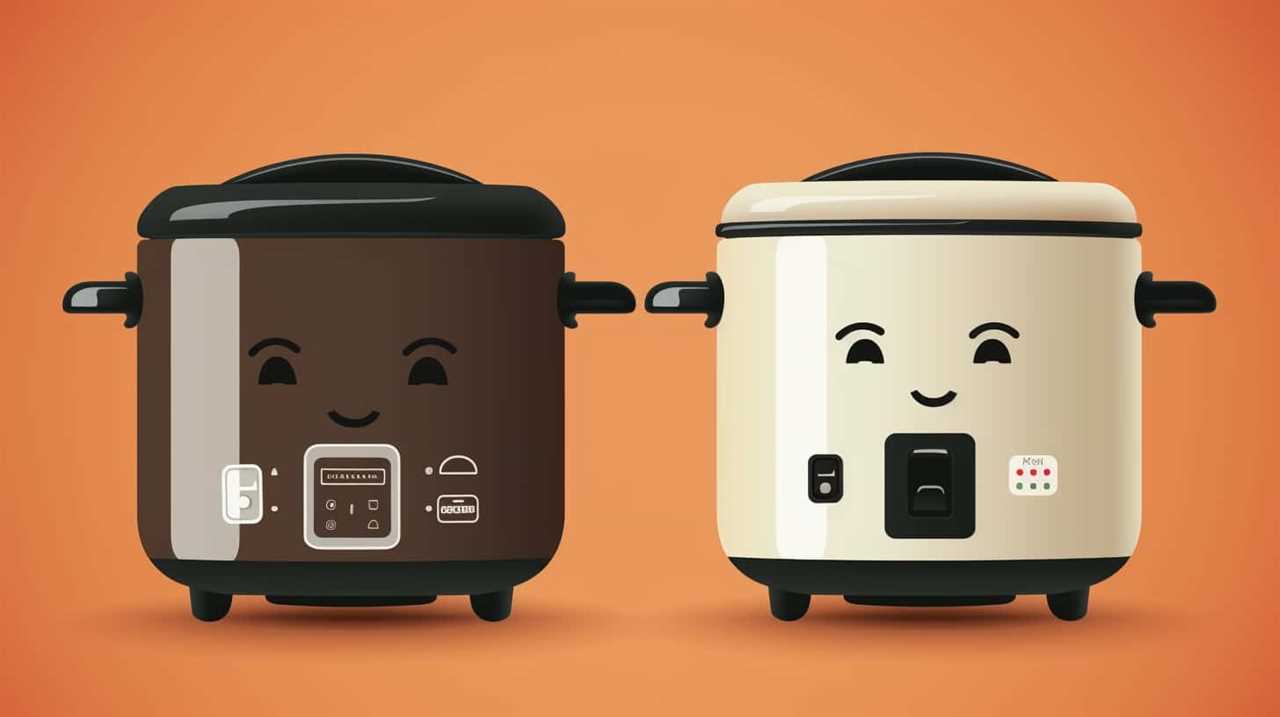
- Cooling performance comparison: Look for fridges that have a high cooling capacity and can maintain low temperatures even in hot outdoor conditions. Compare the cooling performance of different models to ensure you choose one that meets your needs.
- Environmental impact considerations: Opt for fridges that are energy-efficient and have eco-friendly features. Look for models that use low-power compressors and have insulation that minimizes heat transfer, reducing the environmental impact of your camping fridge.
Considering the cooling capacity and environmental impact of a solar-powered camping fridge is crucial for ensuring you have a reliable and sustainable cooling solution during your outdoor adventures.
Now, let’s move on to the next important aspect to consider – portability and mobility.
Portability and Mobility
When considering the portability and mobility of solar-powered camping fridges, it’s important to prioritize ease of transportation and maneuverability. These fridges are designed to be taken on outdoor adventures, so having features that make them easy to carry and move around is crucial.
One key aspect to look for is portability features such as sturdy handles and durable wheels. This allows you to easily transport the fridge from your vehicle to your campsite without straining your back or having to make multiple trips. Additionally, consider the weight of the fridge itself. Opt for lightweight models that won’t add unnecessary bulk to your camping gear.
Another important consideration is solar panel compatibility. Since the purpose of a solar-powered camping fridge is to operate off-grid, it’s essential to ensure that the fridge is compatible with solar panels. Look for fridges that have built-in charge controllers and are compatible with various solar panel configurations. This will allow you to harness the power of the sun to keep your food and beverages cool without relying on traditional power sources.
Solar Charging Efficiency
Let’s assess the solar charging efficiency of solar-powered camping fridges. When it comes to choosing the right fridge for your outdoor adventures, the solar charging efficiency is a crucial factor to consider. Here are some key points to keep in mind:
- Solar Panel Maintenance: Regular maintenance of the solar panels is essential to ensure optimal charging efficiency. Keep the panels clean and free from debris, as any dirt or obstructions can significantly reduce their ability to harness solar energy.
- Power Output Optimization: To maximize the charging efficiency, it’s important to position the solar panels in direct sunlight. Avoid placing them in shaded areas or obstructing them with objects that can cast shadows. Additionally, using high-quality solar panels with a higher power output can help you charge your camping fridge more efficiently.
By following these guidelines, you can ensure that your solar-powered camping fridge operates at its highest charging efficiency.
Now that we’ve discussed the solar charging efficiency, let’s move on to the next section, where we’ll delve into the important aspect of ‘price and value for money’.
Price and Value for Money
To assess the value for money of solar-powered camping fridges, we need to consider the price in relation to the features and durability they offer. When it comes to solar powered camping fridges, there are options available for every budget. If you’re looking for a budget-friendly option, there are several models that provide excellent value for money. These fridges may not have all the bells and whistles of their more expensive counterparts, but they still offer reliable cooling performance and durability.
When comparing prices, it’s important to consider the features that are essential for your camping needs. Some fridges may have additional features like built-in solar panels or dual-zone compartments, which can increase the price. However, if these features aren’t necessary for your camping trips, you can save money by opting for a simpler model.
Durability is also a key factor to consider when evaluating the value for money of solar-powered camping fridges. Look for fridges that are made with high-quality materials and have a sturdy construction to ensure they can withstand the rigors of outdoor use.
In conclusion, when choosing a solar-powered camping fridge, it’s important to find the right balance between price and the features and durability that are essential for your camping needs. By considering these factors, you can find a budget-friendly option that offers great value for money.
Now, let’s move on to discussing the next important factor to consider when choosing a solar-powered camping fridge: the noise level.
Noise Level
As we consider the next important factor in choosing a solar-powered camping fridge, it’s important to address the noise level. When you’re out in the wilderness, the last thing you want is a noisy fridge disturbing the tranquility of your surroundings.
Here are some key points to keep in mind when it comes to the noise level of a solar-powered camping fridge:
- Silent operation: Look for fridges that are specifically designed to operate quietly. These models are equipped with noise reduction technology, ensuring that you can enjoy a peaceful camping experience without any unnecessary disturbances.
- Power consumption: It’s important to find a balance between a quiet fridge and efficient power consumption. While some fridges may operate silently, they might consume more power, which can be a concern when you’re relying solely on solar energy. Look for fridges that offer a good balance between noise level and power efficiency.
- User reviews: Don’t just rely on the manufacturer’s claims about noise level. Check user reviews to get real-life feedback from people who’ve already used the fridge. This will give you a more accurate idea of how silent the fridge actually is.
Considering the noise level is essential when choosing a solar-powered camping fridge. Now that we’ve covered this factor, let’s move on to discussing some additional features to look for in your ideal camping fridge.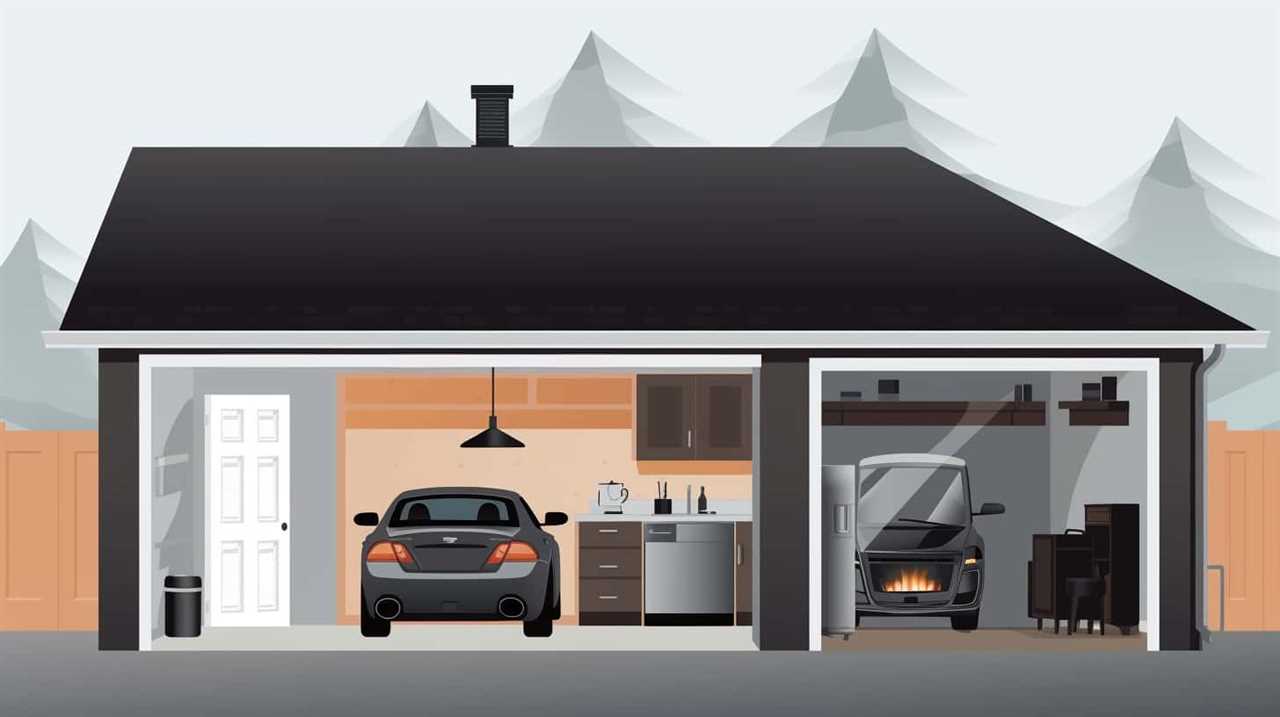
Additional Features
Continuing our exploration of choosing a solar-powered camping fridge, we should now delve into the additional features that can enhance your camping experience.
When it comes to a camping fridge, having precise temperature control is essential. Look for a fridge with advanced thermostat features that allow you to set and maintain the desired temperature accurately. This feature ensures that your food and drinks stay fresh and cool, even in hot weather.
Another important aspect to consider is insulation technology. The insulation of a camping fridge plays a crucial role in its overall performance. Look for fridges that feature high-quality insulation materials, such as thick foam or vacuum panels. These technologies help to minimize heat transfer, keeping the inside of the fridge cool for longer periods. Additionally, good insulation ensures that your fridge operates efficiently, reducing the load on the solar panels and prolonging battery life.
Some camping fridges also come with extra features that can enhance your camping experience. These may include built-in LED lights, USB ports for charging devices, or even Bluetooth connectivity for convenient control through a smartphone app. While these features may not be essential, they can certainly add convenience and functionality to your camping setup.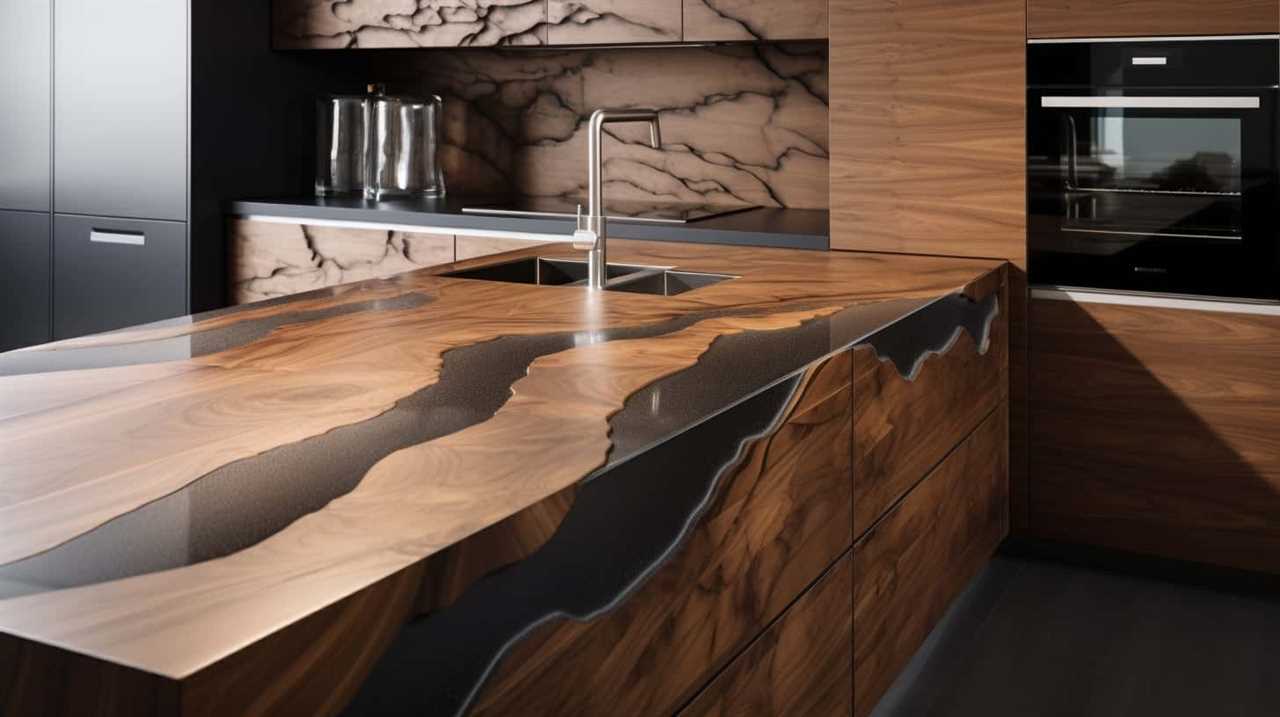
Frequently Asked Questions
Can I Use a Solar-Powered Camping Fridge in Extreme Temperatures?
In extreme temperatures, using a solar-powered camping fridge can be challenging. However, there are tips for maximizing its efficiency.
Firstly, ensure proper insulation by using a fridge with thick walls and a well-sealed door.
Additionally, position the fridge in a shaded area to minimize exposure to direct sunlight.
Lastly, consider using a portable solar panel with a higher wattage to generate more power.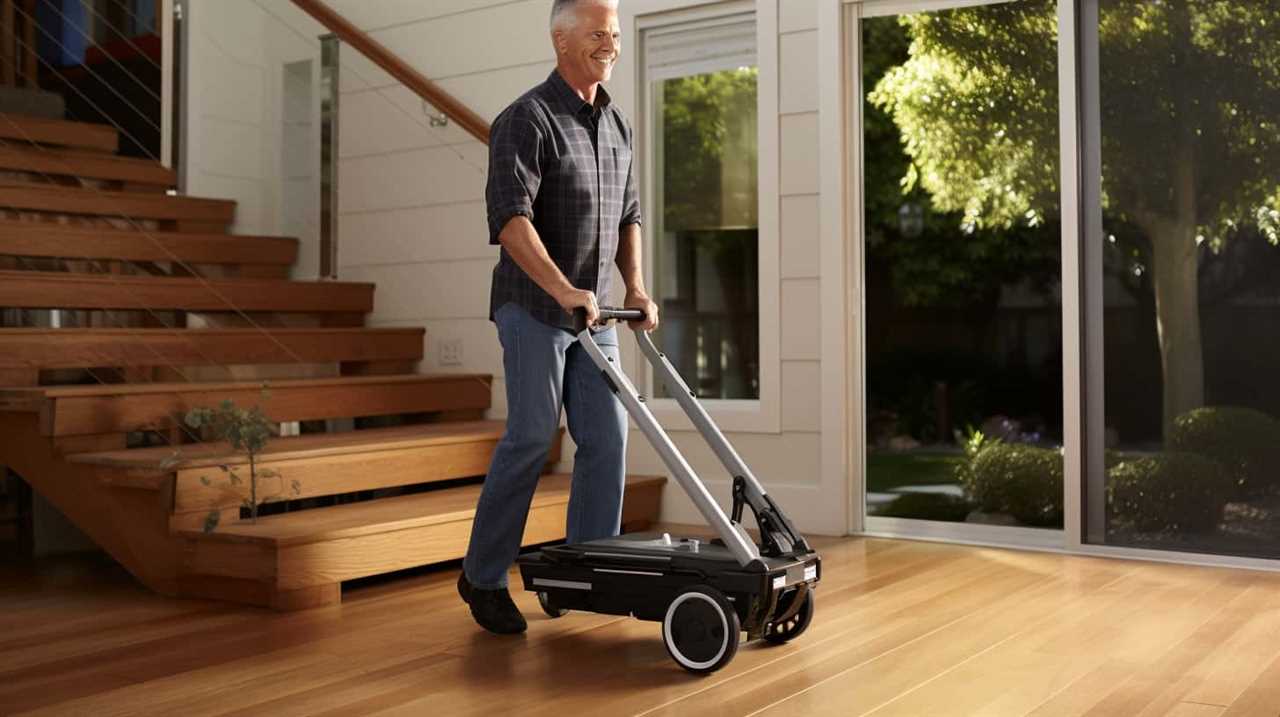
How Long Does It Take for a Solar-Powered Camping Fridge to Cool Down After Being Turned On?
When it comes to the cooling efficiency of a solar-powered camping fridge, there are a few tips that can help maximize its performance.
Firstly, make sure to place the fridge in a shaded area to avoid direct sunlight. Additionally, keeping the fridge well-insulated and minimizing the opening of the door will help maintain cool temperatures.
Lastly, troubleshooting common issues such as checking the solar panel connections and ensuring proper ventilation can ensure optimal cooling.
Can I Use a Solar-Powered Camping Fridge While Driving in My Rv?
Yes, you can use a solar-powered camping fridge while driving in your RV. Solar-powered camping fridges are designed to work on the go, allowing you to keep your food and drinks cool during your travels.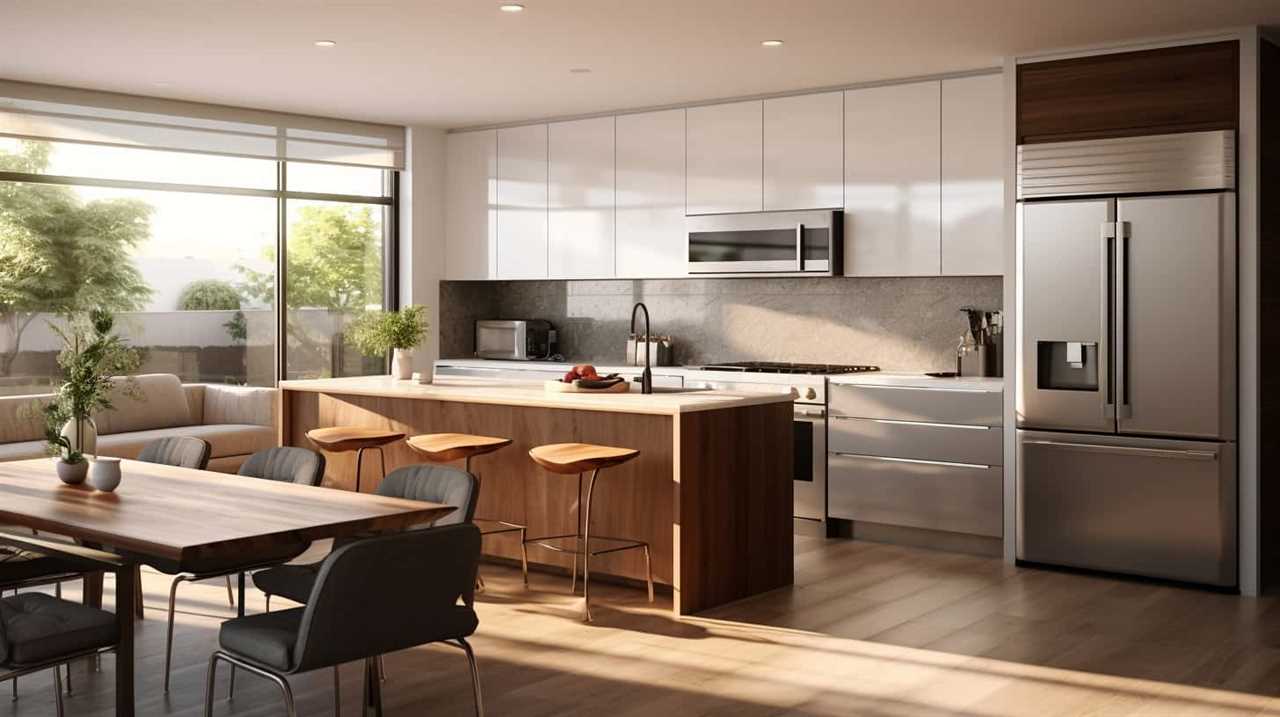
However, it’s important to consider the pros and cons of using a solar-powered camping fridge in different weather conditions. While solar power is a great renewable energy source, it may be less efficient in cloudy or rainy weather.
Nonetheless, solar-powered camping fridges provide a practical and eco-friendly solution for keeping your food fresh while on the road.
Are Solar-Powered Camping Fridges Suitable for Long Camping Trips?
When considering solar-powered camping fridges for long camping trips, there are both pros and cons to keep in mind.
On the positive side, these fridges provide a reliable and eco-friendly way to keep your food and drinks cool without relying on traditional power sources.
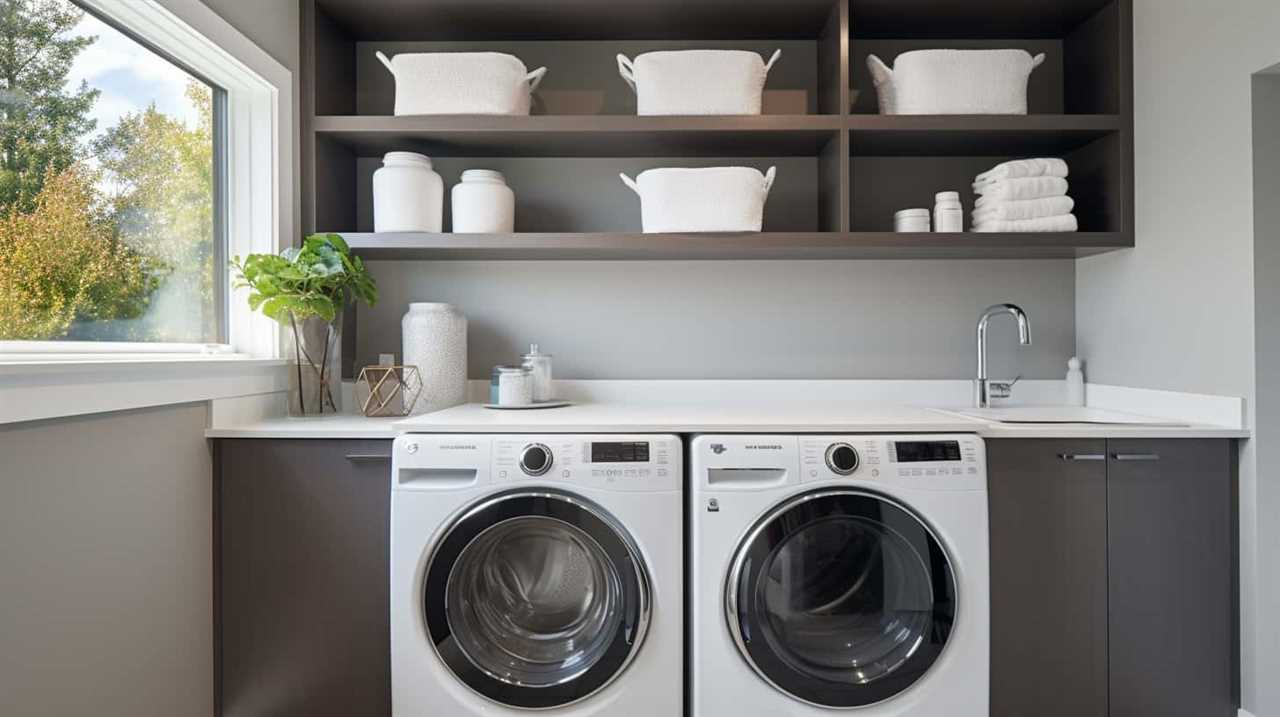
However, it’s important to properly maintain and care for your fridge during extended trips. Regularly cleaning the solar panels and checking the battery levels will ensure optimal performance.
Can I Connect Multiple Solar Panels to Increase the Charging Efficiency of My Camping Fridge?
Yes, connecting multiple solar panels can significantly improve the charging efficiency of your camping fridge. By increasing the amount of solar energy harvested, you can ensure a more reliable and consistent power supply.
However, it’s essential to consider the compatibility of your fridge and the solar panels, as well as the wiring configuration.
Additionally, exploring alternative power sources, such as portable power stations or generators, can provide backup options in case of insufficient sunlight.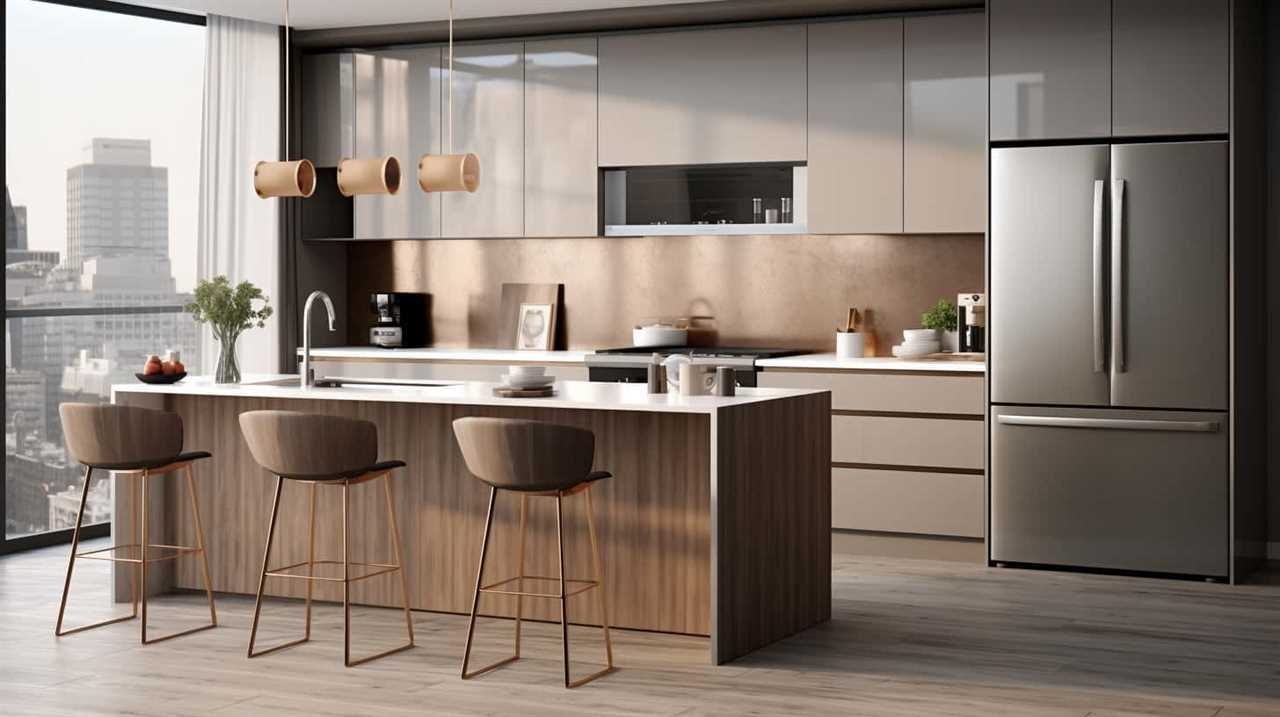
Conclusion
In conclusion, when it comes to choosing a solar-powered camping fridge, it’s important to consider factors such as:
- Energy efficiency: Look for a fridge that has a high energy efficiency rating, as this will help conserve power and extend battery life.
- Power capacity: Consider the amount of food and drinks you plan to bring on your camping trip and choose a fridge with sufficient power capacity to accommodate your needs.
- Size and weight: Opt for a fridge that is compact and lightweight, making it easier to transport and fit into your camping setup.
- Cooling performance: Ensure that the fridge has a reliable cooling system that can maintain a consistent temperature, keeping your food and drinks fresh.
- Battery life: Look for a fridge with a long-lasting battery life, so you won’t have to worry about running out of power during your camping trip.
- Solar charging efficiency: Consider the efficiency of the fridge’s solar charging capabilities, as this will determine how quickly and effectively it can recharge its battery using solar energy.
- Price: Set a budget and choose a fridge that offers the best value for your money, taking into account its features and durability.
- Noise level: If you prefer a quiet camping experience, look for a fridge that operates silently to avoid any disturbances.
- Additional features: Consider any extra features that may enhance your camping experience, such as a built-in freezer compartment or a digital temperature control.
While these tips may seem overwhelming, remember that investing in a high-quality fridge will ensure your camping experience is cool and refreshing. So, don’t let your outdoor adventures turn into a hot mess – choose wisely and chill out!
- About the Author
- Latest Posts
Introducing Charles, the Editor in Chief at ByRetreat, whose passion for interior design and editorial excellence elevates every remote workspace to new heights. With his keen eye for detail, impeccable taste, and expertise in design, Charles brings a wealth of knowledge and creativity to the ByRetreat team.
As the Editor in Chief of a renowned lifestyle blog, Charles has honed his skills in curating captivating content and staying up-to-date with the latest trends in interior design. His deep understanding of aesthetics and the power of storytelling through design enables him to create remote workspaces that are not only visually stunning but also rich in personality and meaning.
Garage Door Opener
Top 5 Garage Door Opener Remotes for Motorcycles
Need a reliable garage door opener remote for your motorcycle? Discover the top 5 remotes that offer convenience and security for your daily routines.
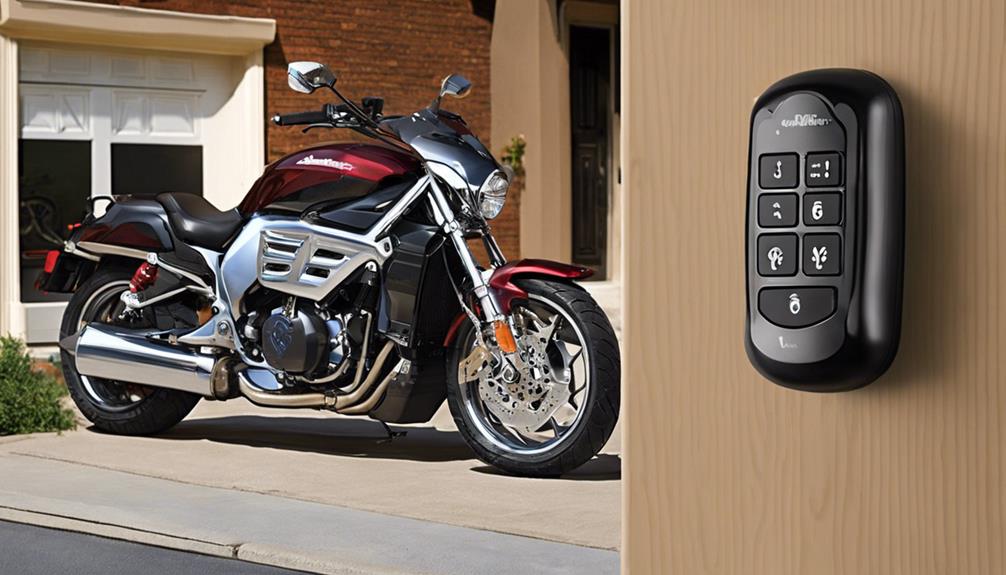
Interested in finding out which garage door opener remotes are great for motorcycles?
The top 5 remotes we've identified offer a range of features that cater to different needs and preferences.
From compact designs to long-range capabilities, these remotes provide convenience and security for motorcycle owners.
Stay tuned to discover how these remotes can enhance your garage access experience and make your daily routines more streamlined and efficient.
Key Takeaways
- Compact design for easy handlebar attachment and operation
- Long-range capability up to 100 feet for convenient garage access
- Weatherproof construction ensures durability in harsh conditions
- Universal compatibility with various motorcycle and garage opener brands
Compact Remote Options
When selecting compact remote options for motorcycles, it's crucial to consider the compatibility with a range of garage door opener brands to ensure seamless integration. These motorcycle garage door opener remotes are designed to work effortlessly with popular brands like Harley Davidson, Ducati, Honda, Kawasaki, and Yamaha R3. The easy programming feature utilizing multi-code technology allows for quick synchronization with various garage door openers, making the setup process a breeze.
These compact remote options come in different package variations, including standard black, chrome, and braided cable assemblies, catering to different aesthetic preferences. The Canadian patented design ensures a simple operation with just a press of a button, providing a convenient experience for motorcyclists. The positive customer reviews and a remarkable 5.0 rating attest to the high satisfaction levels and the endorsement of the product's functionality in real-world scenarios.
When it comes to compact remote options for motorcycle garage door openers, easy programming and seamless compatibility are the key features that guarantee a liberating and hassle-free experience.
Long Range Performance
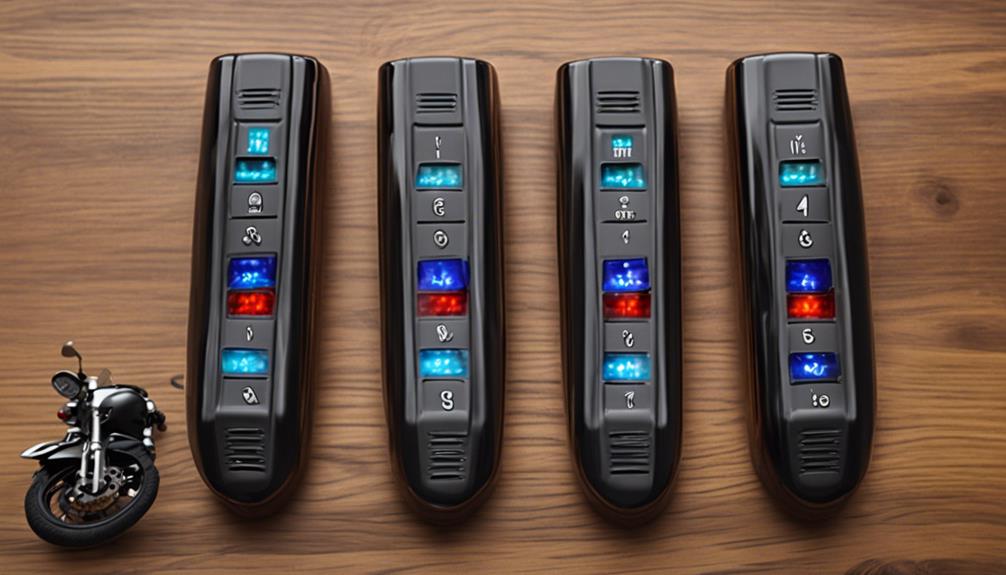
With a focus on enhancing convenience and accessibility, remote options like the Riders Magic Touch offer impressive long-range performance capabilities of up to 100 feet for seamless garage access. These garage door remotes are designed to work efficiently with motorcycles, ensuring that you can easily open your garage door from a distance without any hassle. Here are some key features to consider for optimal long-range performance:
- Compatible with various garage door opener brands for versatile use.
- Enhanced signal strength and range for reliable operation even from afar.
- Allows quick and easy access to the garage without needing to dismount the motorcycle.
- Works reliably to provide seamless garage access every time.
- Easy to install and set up for immediate use.
When looking for a garage door remote that excels in long-range performance, options like the Riders Magic Touch and Kustom Cycle Parts Universal Opener Remote are excellent choices for motorcyclists seeking liberation and convenience.
Weatherproof Designs
Incorporating weatherproof designs into garage door opener remotes ensures their resilience against environmental factors, guaranteeing prolonged functionality in outdoor settings. These remotes are specifically crafted to withstand the harshest conditions, making them ideal for garages, doors, and other outdoor applications.
With materials chosen to resist wear and tear from rain, sun exposure, and other weather elements, these weatherproof remotes provide reliable operation regardless of the outdoor environment. Constructed from high-quality components, they maintain peak performance even in extreme conditions, offering peace of mind to users who rely on them for accessing their garages or doors.
Whether mounted on motorcycles, golf carts, or other outdoor vehicles exposed to the elements, these weatherproof garage door opener remotes deliver the durability and longevity necessary for seamless functionality in any weather. For those seeking a dependable solution for outdoor access control, weatherproof designs ensure consistent performance and longevity in challenging environments.
Easy Mounting Solutions
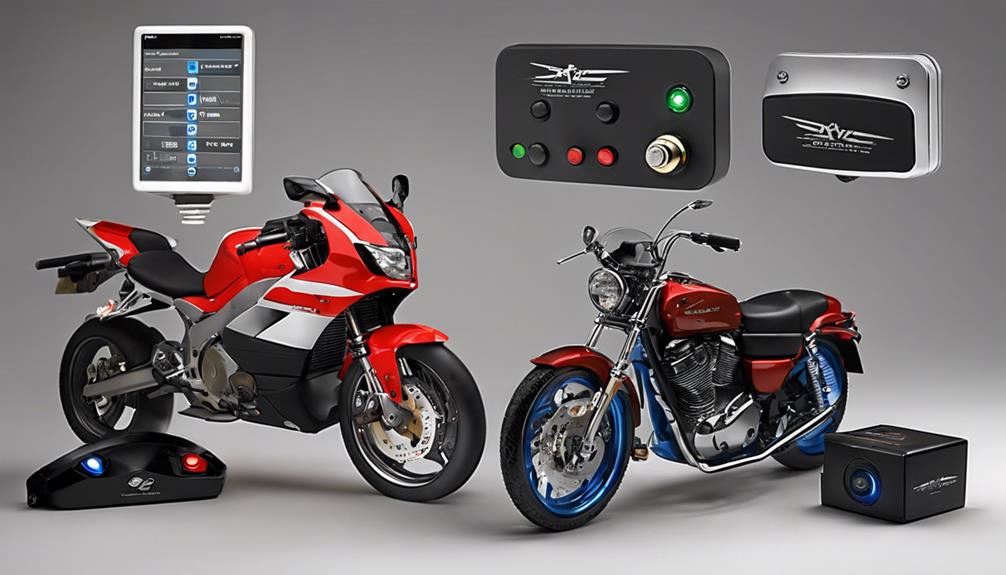
To ensure effortless installation and accessibility, motorcycle garage door opener remotes offer easy mounting solutions designed for quick attachment to handlebars. These remotes come with mounting hardware that simplifies the process, making it convenient for riders to access their garage doors.
Here are five key points about the easy mounting solutions for motorcycle garage door opener remotes:
- Mounting hardware included for quick and hassle-free attachment.
- Designed to fit most motorcycle handlebars for easy access.
- Customizable mounting options available to suit individual preferences.
- Secure attachment ensures the remote stays in place during rides.
- Easy installation process allows users to start using the garage door opener without delays.
Universal Compatibility
For seamless integration with a wide range of motorcycles and garage door opener brands, the universal compatibility of these motorcycle garage door opener remotes ensures convenient access for riders. These door opener remotes are designed to work with popular motorcycle brands like Harley Davidson, Ducati, Honda, Kawasaki, and Yamaha R3, providing riders with a versatile solution for their garage door access needs. Additionally, they're compatible with a variety of garage door opener brands such as Chamberlain, Genie, Linear, Stanley, and Wayne Dalton, offering flexibility and convenience.
The programming process is straightforward, allowing users to easily sync the remote with their garage door openers. With the inclusion of features like the Learn Button function, these remotes can adapt to different existing switch styles, ensuring a seamless connection. This compatibility ensures that riders can enjoy a hassle-free experience when accessing their garages, making these remotes a practical and efficient solution for motorcycle enthusiasts seeking liberation and convenience in their daily routines.
Frequently Asked Questions
What Brand of Garage Door Opener Is the Most Reliable?
When it comes to reliability, Chamberlain stands out as a top choice among garage door opener brands. Its reputation for durability and consistent performance makes it a favorite among motorcycle owners.
With Chamberlain, you can trust that your garage door opener will function smoothly and reliably, providing peace of mind for your motorcycle security needs.
What Is the Highest Horsepower Garage Door Opener?
We know the highest horsepower garage door opener on the market is 1.25 HP. This robust motor efficiently operates heavy garage doors in commercial or residential settings. Its high horsepower rating allows it to effortlessly lift and lower large, heavy doors.
Compared to lower horsepower models, this opener offers superior performance and durability. Whether for a business or home, this powerful motor ensures smooth garage door operation.
Who Makes Aviator Garage Openers?
We've got the answer you've been waiting for! Aviator Garage Openers, those top-notch products, are crafted by the esteemed manufacturer Aviator Garage.
Their cutting-edge features like rolling code technology offer elevated security and ease of use. Compatible with various garage security systems, these openers are durable and reliable, perfect for motorcycle owners seeking peace of mind.
Aviator Garage ensures quality, longevity, and resistance to wear and tear.
How Do I Know Which Garage Door Remote to Buy?
When choosing a garage door remote, we prioritize compatibility with your motorcycle brand and the opener brand. Look for customization options like package combinations and easy programming features for convenience.
To make the best choice, read customer reviews to verify functionality, reliability, and user satisfaction. Ensure the remote has multi-code options and simple button press programming.
Conclusion
In conclusion, the top 5 garage door opener remotes for motorcycles offer a range of features to enhance convenience and security.
One interesting statistic to note is that these remotes have a long-lasting battery life of up to 5 years, providing reliable performance over an extended period.
With easy installation, universal compatibility, and durable construction, these remotes are a practical choice for motorcycle owners looking to streamline their garage access experience.
- About the Author
- Latest Posts
Introducing Ron, the home decor aficionado at ByRetreat, whose passion for creating beautiful and inviting spaces is at the heart of his work. With his deep knowledge of home decor and his innate sense of style, Ron brings a wealth of expertise and a keen eye for detail to the ByRetreat team.
Ron’s love for home decor goes beyond aesthetics; he understands that our surroundings play a significant role in our overall well-being and productivity. With this in mind, Ron is dedicated to transforming remote workspaces into havens of comfort, functionality, and beauty.
-

 Decor2 weeks ago
Decor2 weeks agoMaximalist Decor Explained: Embrace More Style
-

 Vetted2 weeks ago
Vetted2 weeks ago15 Best Foot Massagers for Neuropathy to Soothe Your Feet and Relieve Discomfort
-

 Vetted3 weeks ago
Vetted3 weeks ago15 Best Sports Laundry Detergents for Keeping Your Activewear Fresh and Clean
-
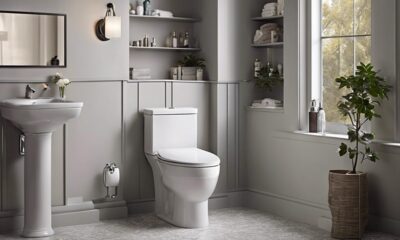
 Vetted4 weeks ago
Vetted4 weeks ago15 Best Tall Toilets for Seniors That Combine Comfort and Safety
-

 Vetted4 weeks ago
Vetted4 weeks ago15 Best Dish Scrubbers to Keep Your Kitchen Sparkling Clean
-
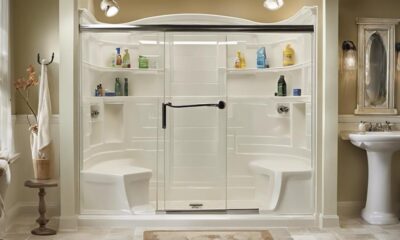
 Vetted4 days ago
Vetted4 days ago15 Best Cleaners for Fiberglass Showers to Keep Your Bathroom Sparkling Clean
-

 Decor4 weeks ago
Decor4 weeks agoWhat Is Eclectic Home Decor
-

 Vetted1 week ago
Vetted1 week ago15 Best Organic Pest Control Solutions for a Naturally Pest-Free Home









